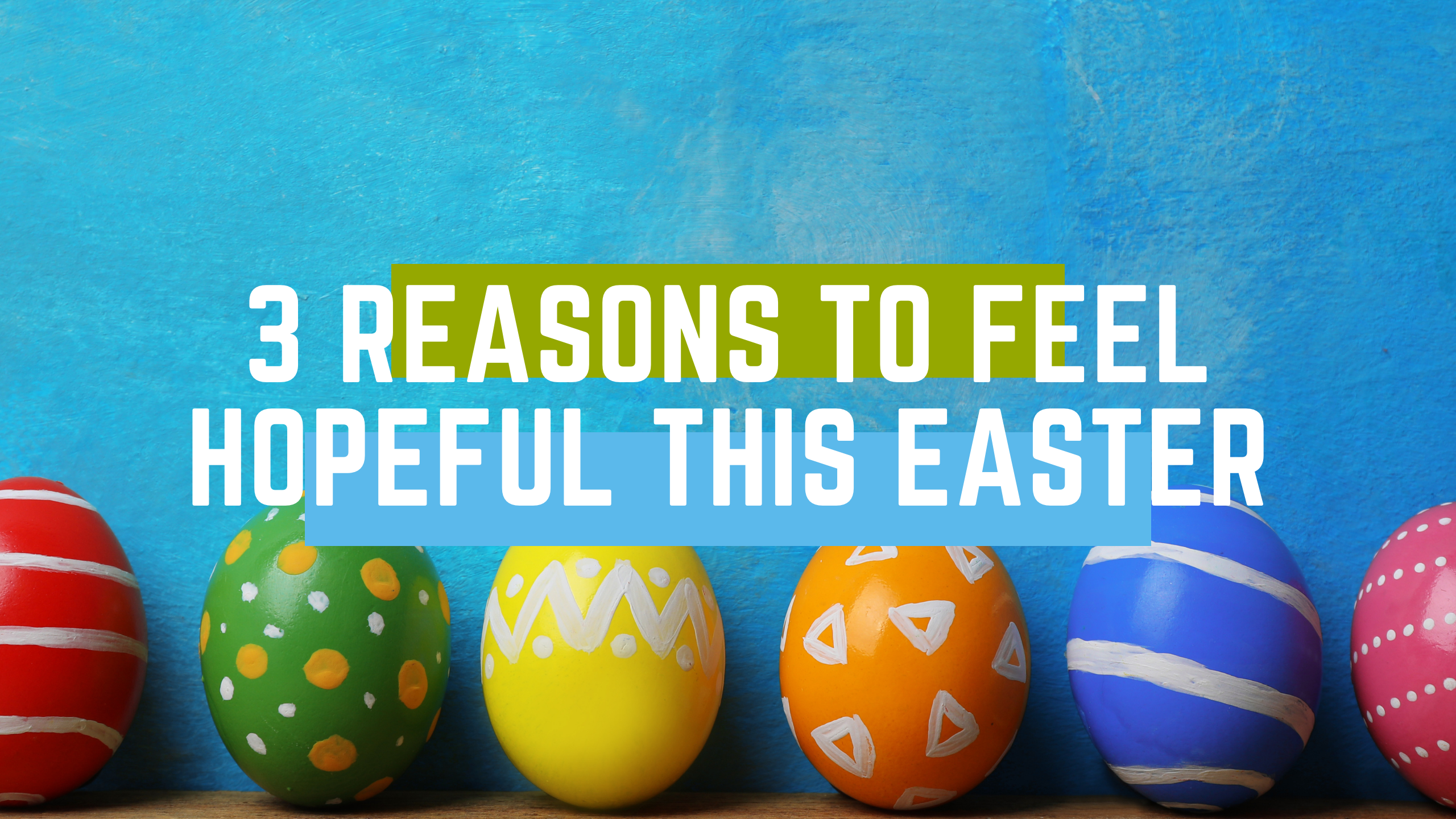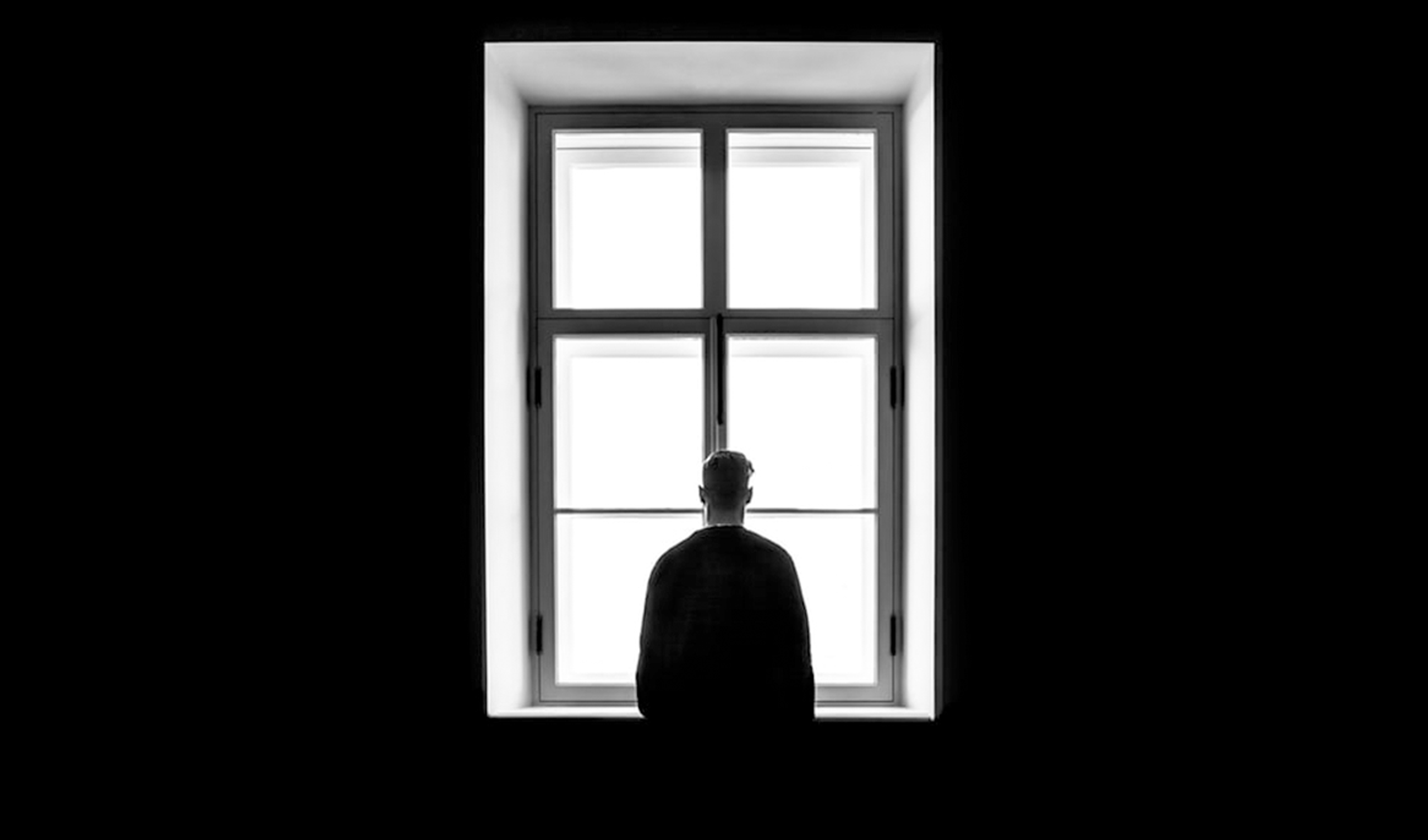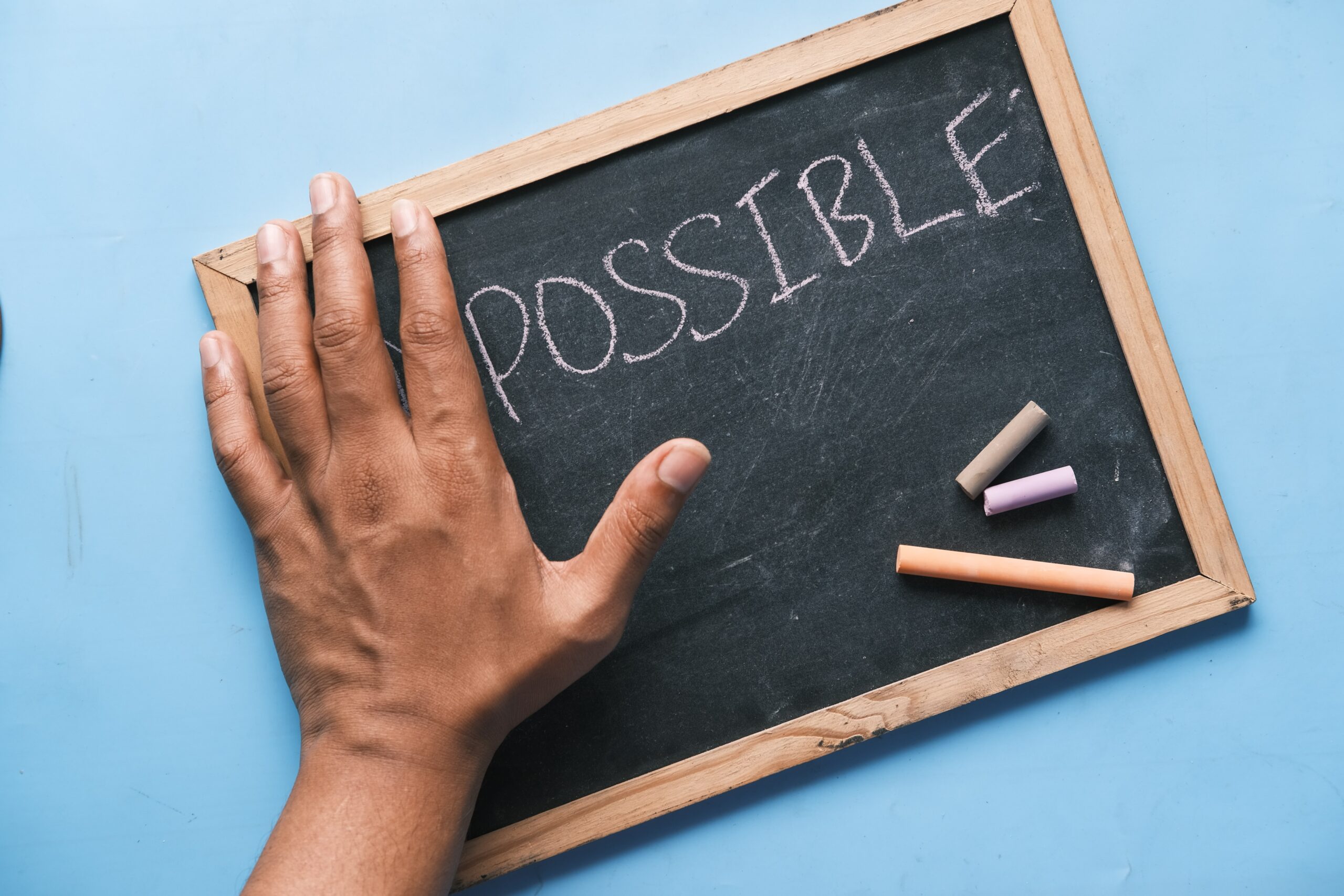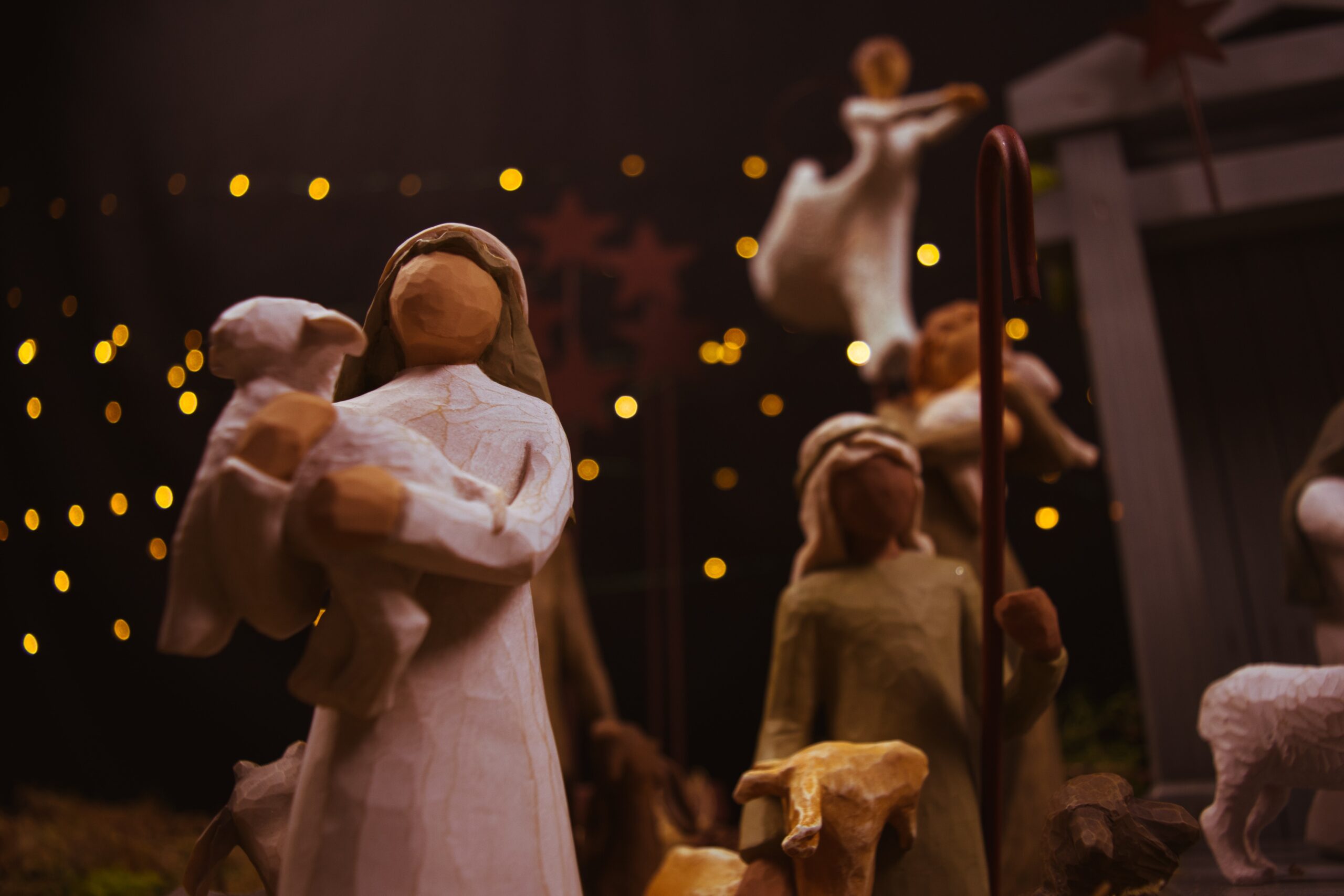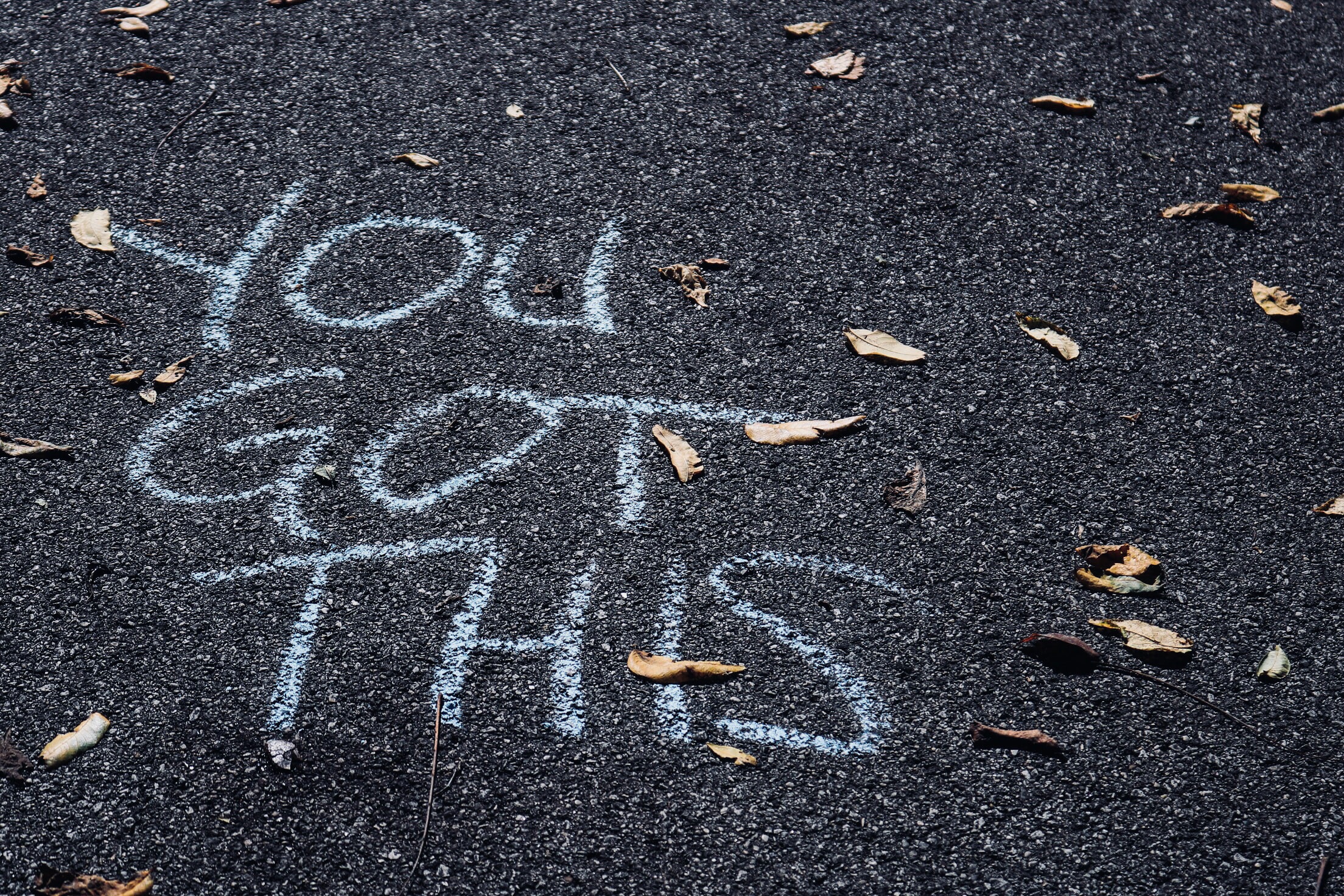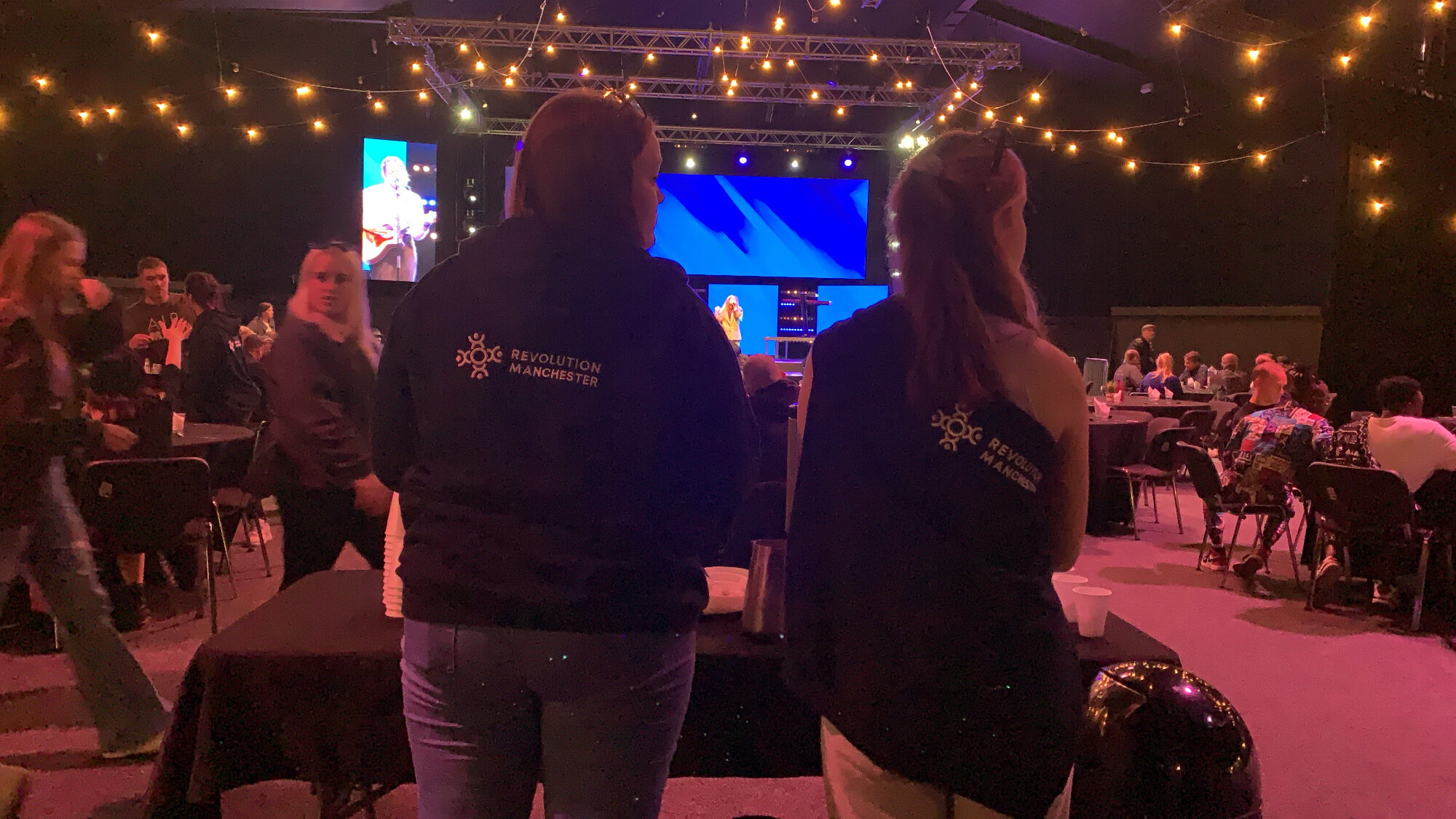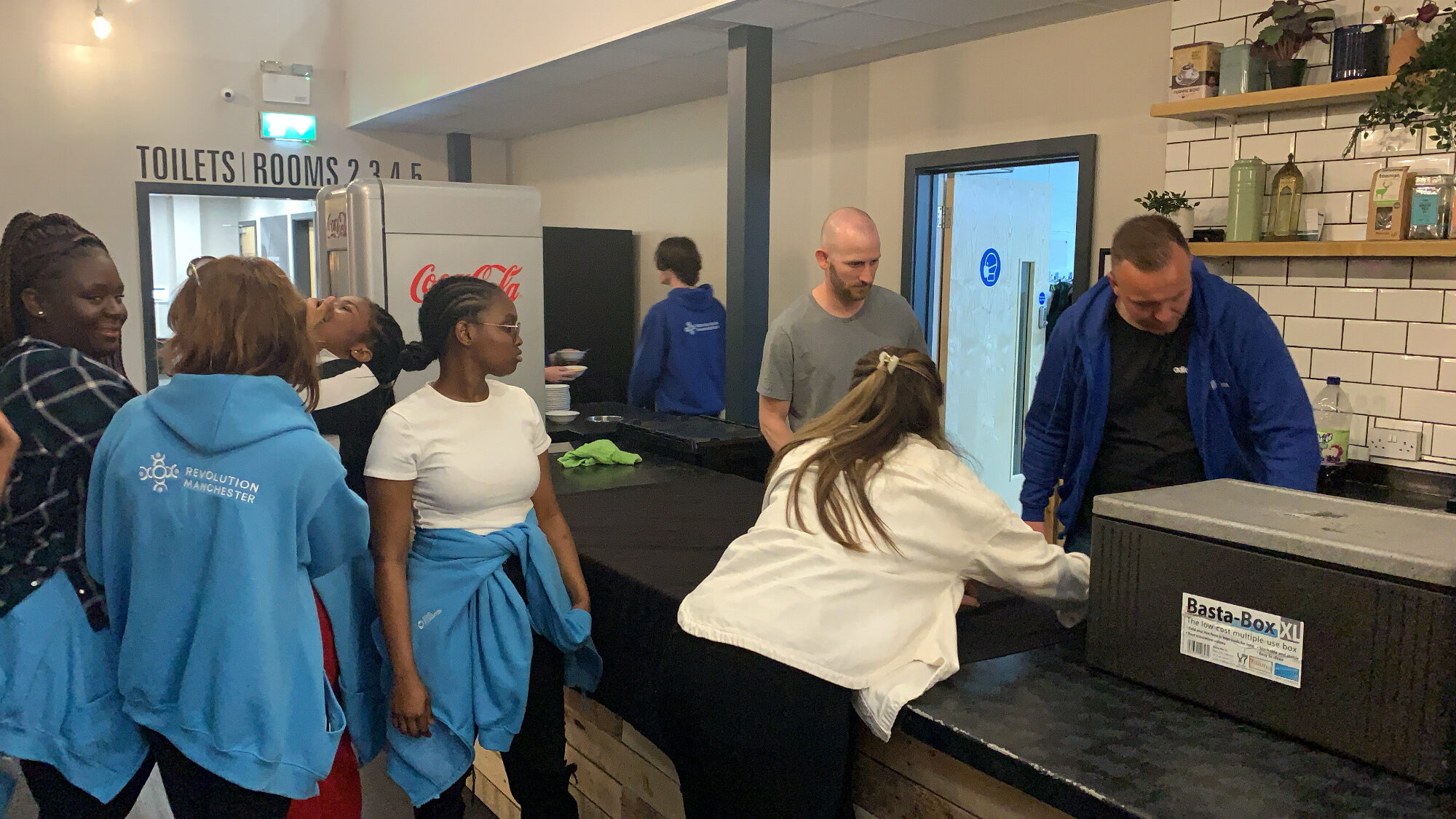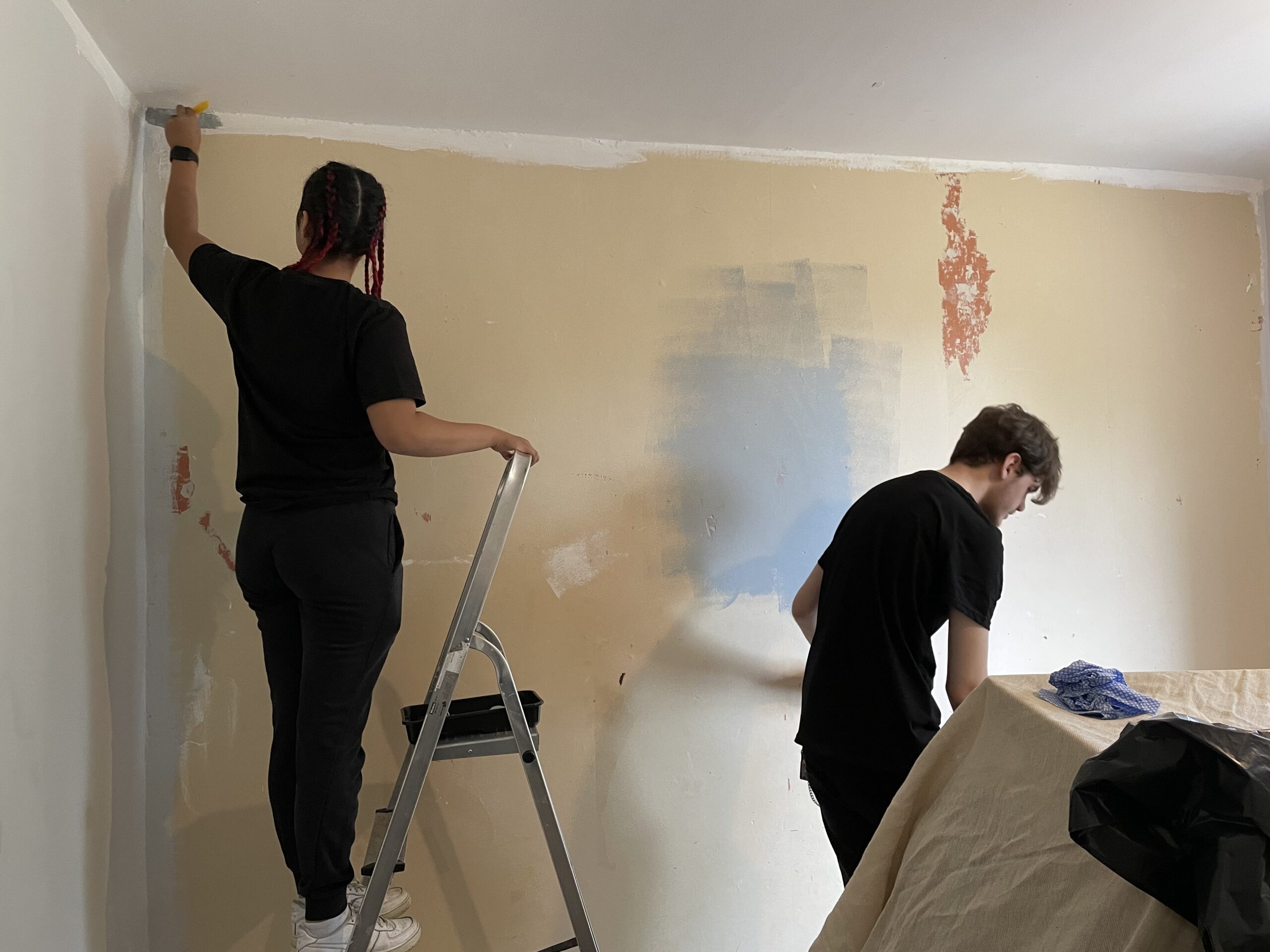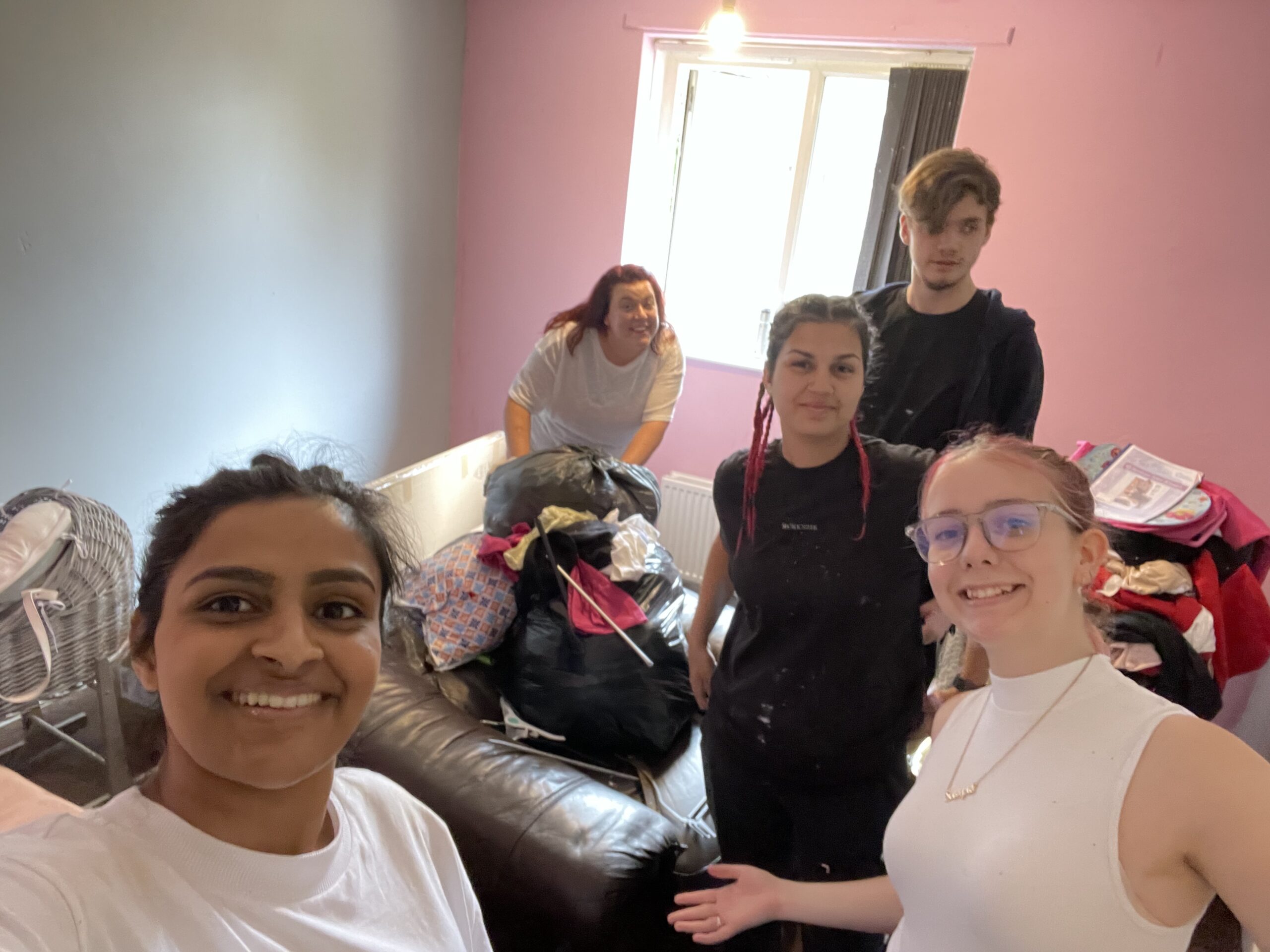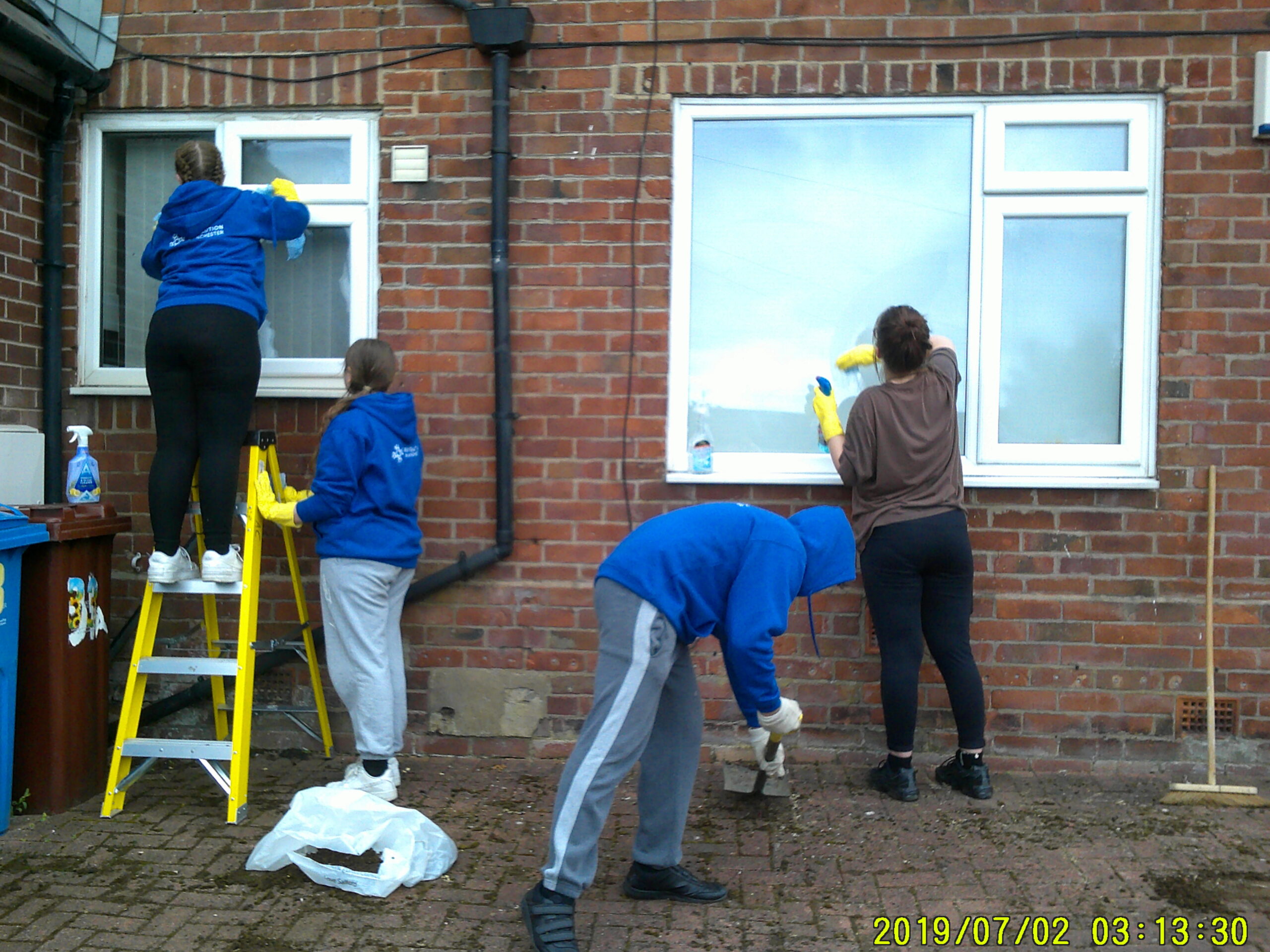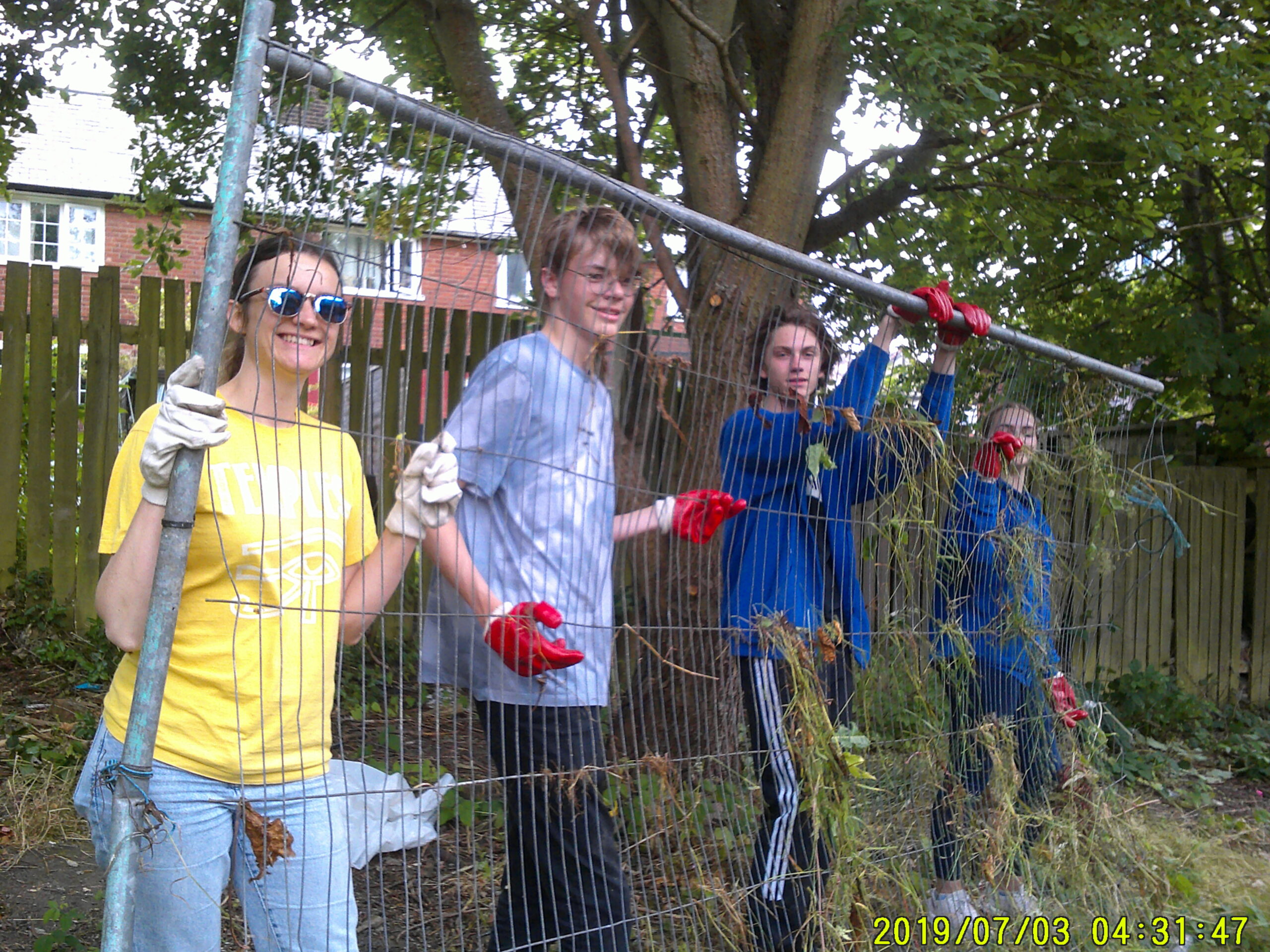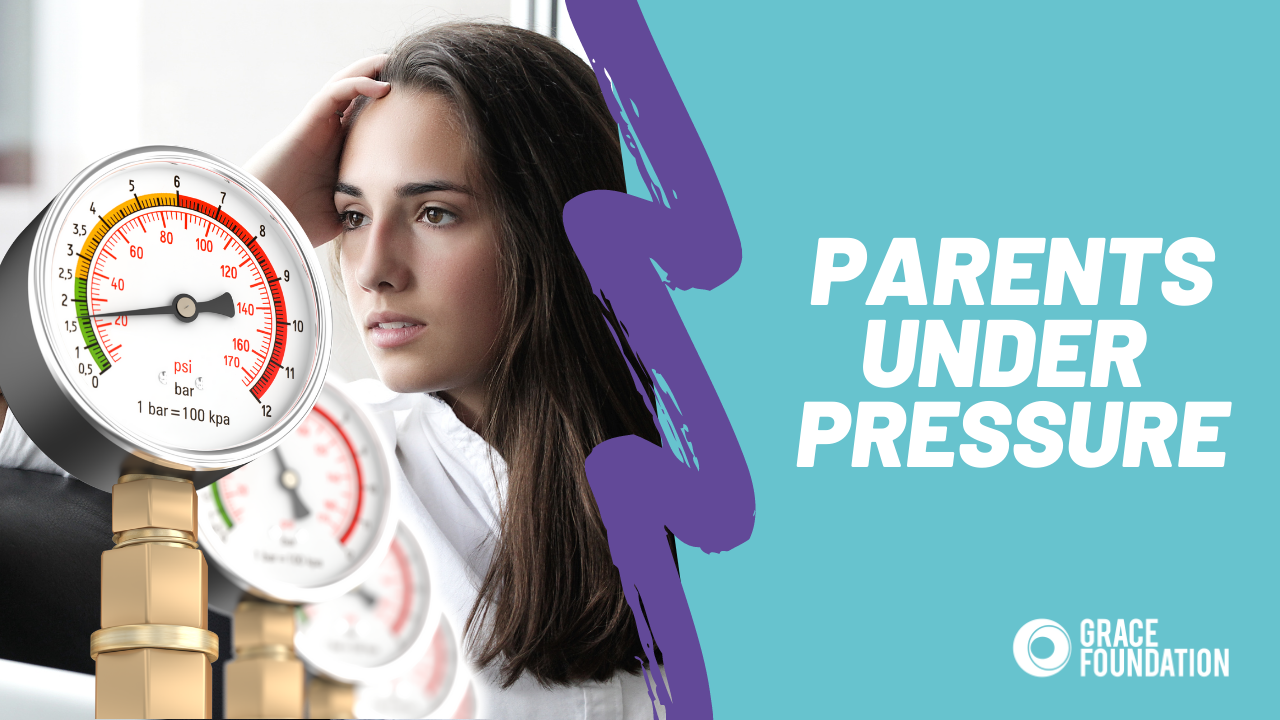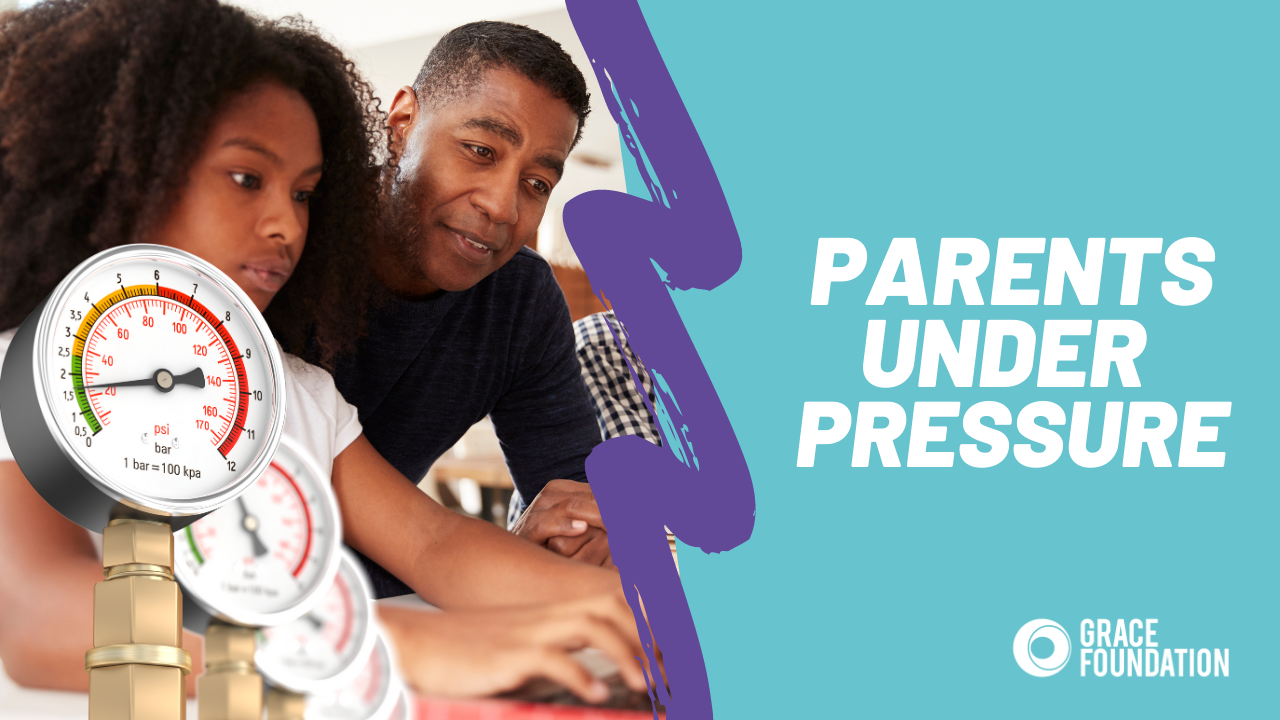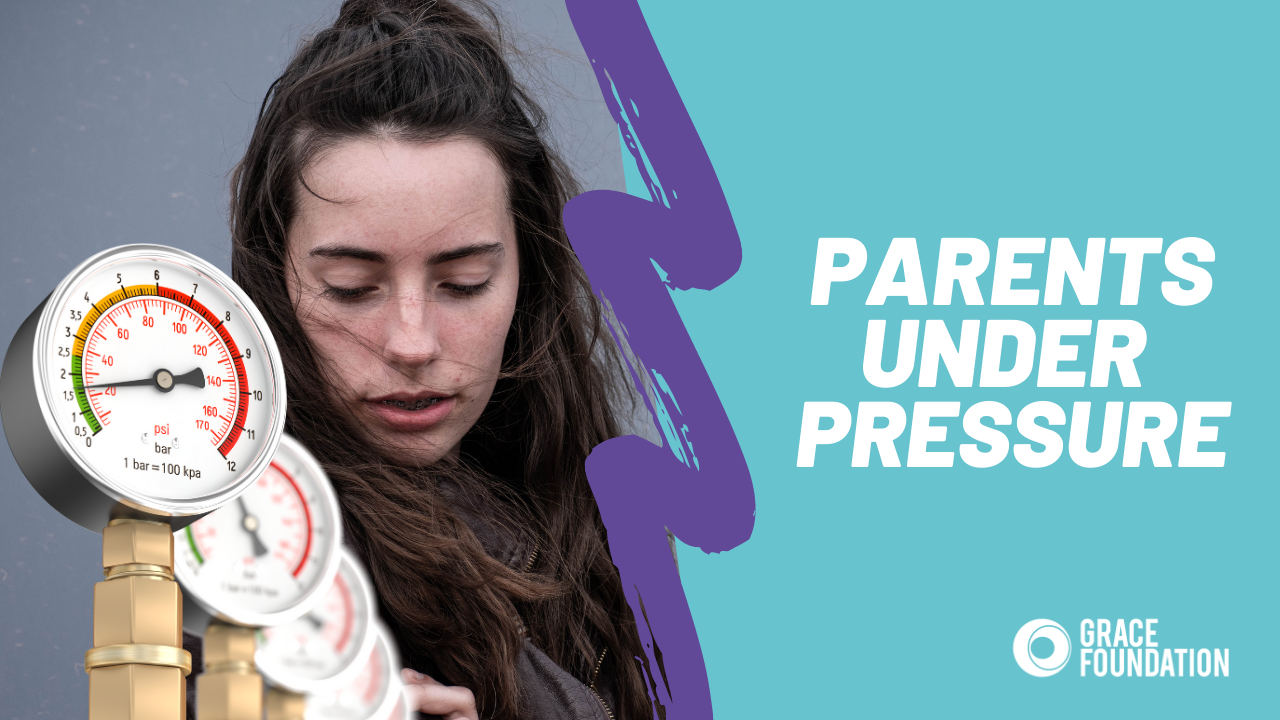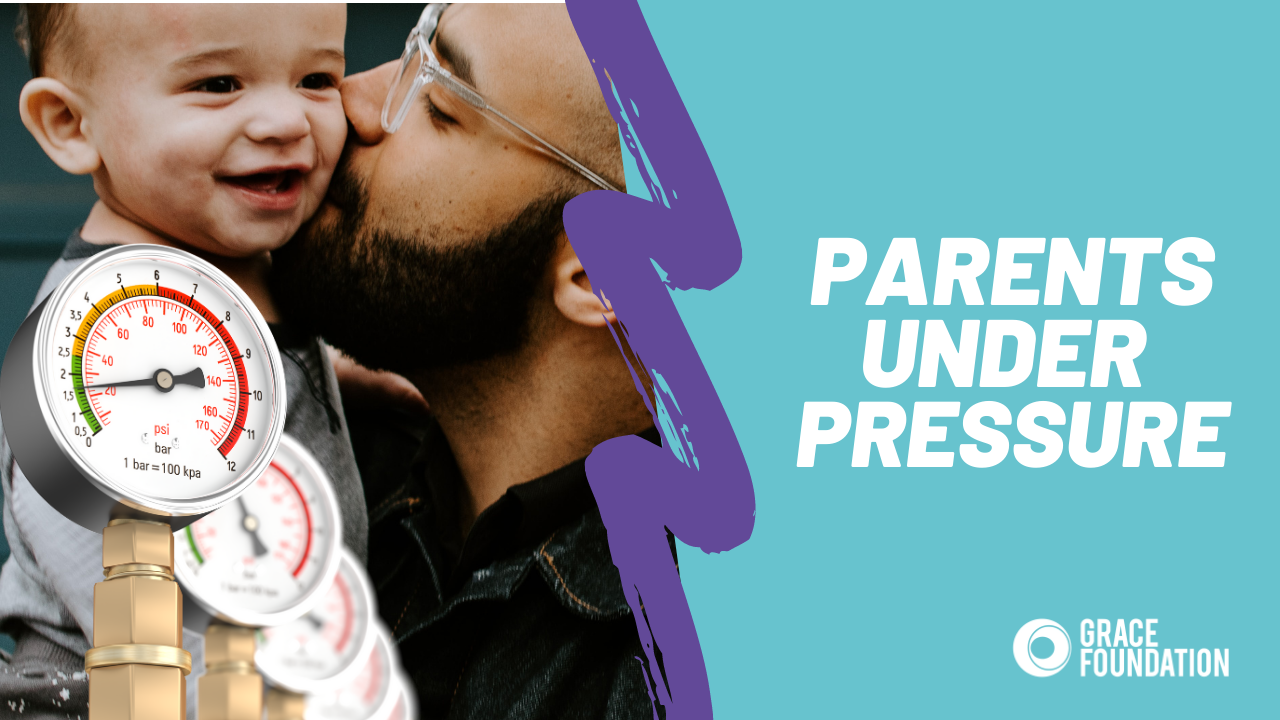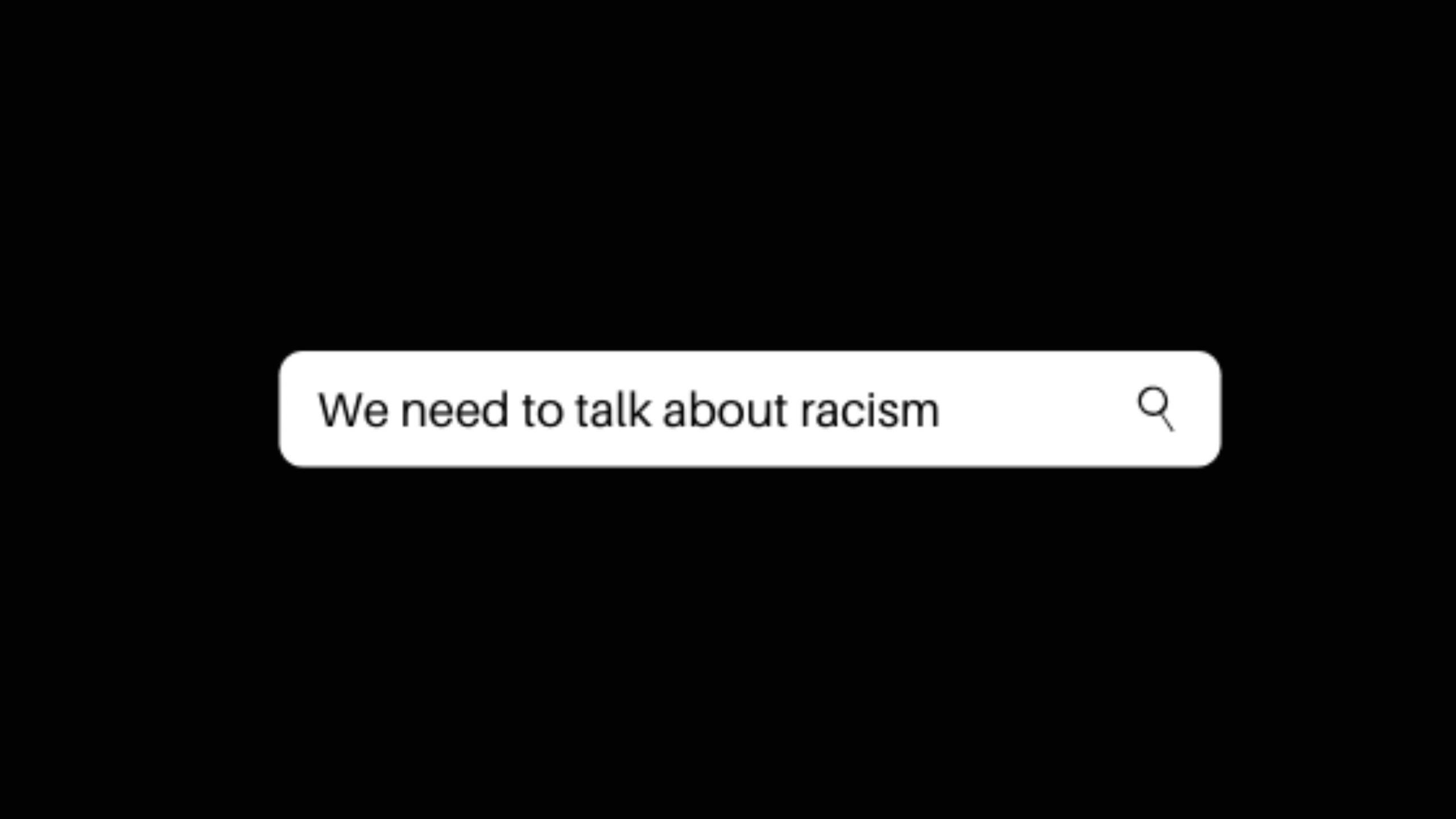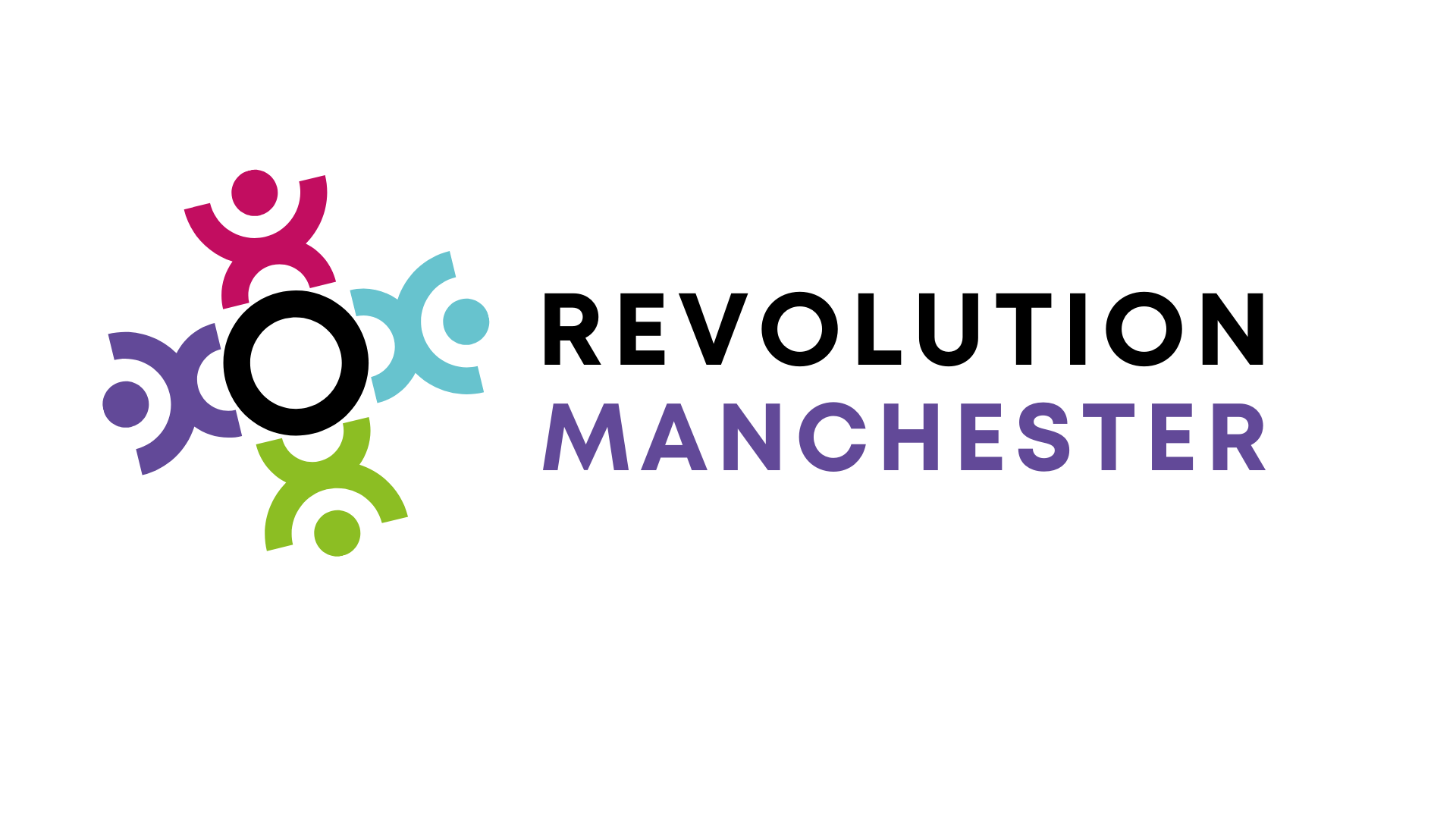3 Reasons to feel Hopeful this Easter
3 Reasons to feel Hopeful this Easter
In this special Blog Post, Dave Boden, our Grace Foundation Ethos Strategic Lead, talks about 3 reasons why we can be hopeful this Easter time.
What do you hope for? It’s a question I have been asked many times in the past and yet hope is a word that has often seemed distant to so many over this recent season of disruption.
Whether it is the simple desire to gather friends around the dinner table, see a Marvel Movie at the Cinema again or the hope rooted in a deep longing to see an elderly relative again, hope makes all the difference. What if hope is part of the antidote to the despair, loss, and pain we have all felt over the last year?
Young people understand that hope matters more than ever. Over the Easter Holiday period we will be sharing poetry created by students from across the schools our Ethos Team work in via our Grace Foundation social media. Please do make sure you follow us on Facebook via https://www.facebook.com/gracefoundationcharity
As one school student said through their poem “Hope is in you it’s there – you just need to scoop it out of you.”
So here are three things that I am hopeful about despite all we have been through together.
1. I am hopeful that young people are tougher than we think
There is no point in trying to gloss over the growing sense of concern about the impact of the pandemic on young people and the statistics and stories we hear daily have not been pretty. Hope is not about denial. Yet during the darkest of times we have seen young people resiliently rising up to adapt to their new context. We know that young people have an incredible ability to bounce back if they are given the right context to thrive. Perhaps now is the time for us all to work together to create that environment for students to thrive again. In this words of this student’s poem:
I hope to see my friends again
The laughs and jokes we had
The times running through the park
Oh I miss those times
I hope to go to school again
Seeing people face to face
And learning in the classrooms
And eating the amazing food
At Grace Foundation we believe young people will show courage and bravery in this next season because we believe in them wholeheartedly. We also want to make sure that those students who have had a really tough time will find hope through a renewed engagement with pastoral people, programmes and practical support.
2. I am hopeful that School communities are stronger than we realised
Years ago, I heard an assembly from a School leader who talked about what it was like to work in dozens of different schools over his career. This leader told us how most schools looked the same from the outside; They all had assembly halls, staff rooms, science labs, school canteens, corridors, and classrooms. Yet only when you looked beneath the surface, could you really understood the what the distinctive culture of a school was really like. Under the surface we discover the strength of the relationships, the care of the staff, and the storm proof systems and structures built to foster community.
The pandemic has seen schools rise with a tenacity to see students succeed no matter what. It has been amazing to see how our school communities have worked together to keep hope alive. Teachers have worked tirelessly to move lessons online and navigate a crazy amount of change in a short space of time. Pastoral staff have worked relentlessly to make sure students are looked after and that they don’t get lost in the chaos. Our Ethos Teams have been on the frontline of supporting the wellbeing of all young people and their families no matter what barriers they have faced. Seeing the way that communities have rallied selflessly together to meet the needs of the next generation has brought me great hope and sets us up for a brighter future.
3. I am hopeful that Easter offers us more than we can imagine
This half term our Ethos Teams have been spending time exploring Easter using a creative interactive multimedia lesson called Who is This Man? It is a modern-day retelling of the story of Easter told through the eyes of the people that Jesus encountered. What’s interesting about this focus on the real Easter story is the poignant reminder how much Jesus was someone who was a carrier of Hope everywhere he went. The need for hope reminds us there is more to our lives than just meeting our physical or practical needs. We are deeply spiritual individuals who yearn for a sense of security, identity, and purpose. It has been encouraging to hear of young people inspired by this message of Jesus even if they don’t follow Christianity for themselves. Perhaps as we all remember that Easter story again, full of second chances, fresh starts and the hope of resurrection, we too will become carriers of hope to others.
The future is not set in stone
Or written in a book
The future is what I make it
So I need to take a look…
Winning Poem – Darlaston Academy
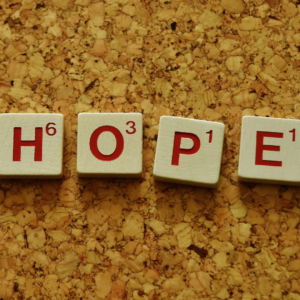
Why not check out our other blog: how to improve your wellbeing during lockdown life?
5 Keys to Combat Anxiety
In this blog Katherine from Grace Foundation shares her top tips with you
Anxiety is that feeling of worry, nervousness, or unease about something about which we are uncertain of the outcome. When we don’t know what is going to happen, it is easy to start to feel scared. There are times in life when we feel nervous for good reason such as before an exam or if you are about to jump out of a plane! This heightened feeling can sharpen our senses and help make us ready for action. But when you start to forget what made you feel concerned in the first place then we can easily get overloaded.
It is normal to have anxious feelings at time of uncertainty and sudden change. What isn’t normal is when feeling unsettled prevents you from doing everyday activities. If this starts to happen you may need to seek help from someone you trust.
In this week’s video we will discover more strategies for dealing with anxiety as outlined in the rest of this Blog below.
Top Tips for dealing with anxiety
Below are five keys for combating fear and worry especially in a time of crisis. These will only make a real difference if you find someone to talk through what is going on for you.
1) Accept
When it is a strange and difficult time, it is okay to give yourself permission to grieve and feel sad about how different life looks and that there are things that you can’t do any more. Grieving doesn’t mean staying in a place of sadness but dealing with your emotions until you finally come to a place of acceptance.
2) Engage
Look for ways to have face to face time with others. Try using free video apps if you can’t meet in person. Seeing someone’s face and hearing their voice always leads to a greater sense of connection than just texting to chat or posting images online.
3) Move
Try doing exercise or help with practical stuff around the house. Exercise gets rid of adrenaline and causes the release of endorphins which is a happy hormone! Helping and engaging with something practical for someone else can take your mind off anxious thoughts and leave you with a sense of achievement.
4) Pause
Take 10-15 minutes a day just being quiet and becoming aware of how your body is feeling. This could look practising mindfulness, having some quiet time or taking deep breaths. Some people pray as a way of connecting with themselves and their spirituality. Have an attitude of gratitude! Taking time out means being thankful for the good things that you do still have in your life.vvvv
5) Learn
- Keeping your mind active through studying and learning is good for your mental health. As well as your studies for school, you can learn about topics for fun as well! Have you always wanted to learn sign language or how to bake a cake? Temporary distraction is a great technique provided it doesn’t become about long term covering up what needs to be dealt with on the inside.
Our Virtual Chaplain says…
“In a world that looks drastically different from day to day it’s easy to feel overwhelmed. Believe it or not the Bible doesn’t promise that we won’t experience difficulties and challenges in life. It does however tell us what to do with our stresses and worries when they come; we can give them to God. If you give something away, it means that you don’t have to carry it anymore. God doesn’t want us to be weighed down with your anxiety, he wants us to be free. Take some time to tell God how you feel and you might just feel that weight lift today!”
Bible Reference: 1 Peter 5 v 7
Takeaways
Take some time to make two lists to help you work through your anxious thoughts
LIST 1: What are you grieving right now?
It’s okay to be sad and grieve for the things you’ve lost and that life looks different. Exressing sadness in a safe way can help you come to terms with your senses of loss.
LIST 2: What are you grateful for right now?
There are still lots of things that you have in your life you can be thankful for e.g. family, friends, pets, food and a home. Greatfulness can reduce anxiety and worry.
#ETHOSCHALLENGE
#ETHOSCHALLENGE
Make a MEME on social media of something you used to be afraid of in the past, but you have now overcome that fear for the future.
FOR EXAMPLE “I used to be scared of Spiders… but I am alright now!” (SPLIT SCREEN PIC OF SPIDER! PIC OF YOU)
Use the hashtag #ethoschallenge to share with others.
Useful Stuff
Samaritans
If you feel like you need to chat to someone urgently or need confidential support if you are experiencing feelings of distress or despair. Phone: 116 123 (free 24-hour helpline)
The Lily Jo Project
Here you will find information on anxiety and stress, as well as other mental health help.
The Mix
The Mix offers essential support for under 25’s with topics covered such as mental health and work and study.
Young Minds
Mental health support. There is a section titled ‘What to do if you’re anxious about coronavirus’.
Stay Safe! – Katherine x
Resources to go with this blog
5 Skills You Can Master At Home
Let’s be honest. Spending the summer in the confines of our houses with nothing but our family members, the house pet, and (if we’re lucky) Netflix to get us through, is far from what we had hoped or imagined. However, there is one precious commodity that presents itself to us all during this season – time. And as a wise man (namely, Stephen R. Cowley) once said, “The key is in not spending your time, but investing it.”
Imagine if we all used this time to invest in mastering a skill we’ve always wanted to learn? At best, we will emerge from the lockdown as competent artists, poets, chefs, coders, musicians and entrepreneurs ready to take the world by storm – at worst – we’ll have at least learned how to sew on a button and save a few quid next time little Jimmy pulls one off his coat… what have we got to lose?!
Top Tips
Here are 5 skills you can master at home…
1) Bake bread from scratch
All you need to make bread is flour, water, yeast, butter, a little bit of oil and the blessed ingredient we’re in no shortage of right now: time. Why not look up some recipes online? Or if you really want to keep things simple, check out Jamie Oliver’s soda bread recipe on YouTube – you don’t even need to get the weighing scales out for that one!
2) Conquer the Rubik’s cube
You know you’ve always wanted to be that person. If you haven’t mastered the age-old challenge yet, what better time than now? No problem if you don’t have a Rubik’s cube lying around at home – you can always use an online simulator instead! Once you’ve cracked it, you could even put your family members to the test to see who can do it the fastest…
3) Take up an instrument/Singing
Whether it’s piano, voice, guitar, steel pans, or actual pots and pans from the kitchen cupboard – now is the perfect time to uncover your inner Mozart. There is a plethora of free YouTube tutorials to help you learn online, or you could even scout out some music teachers who are offering lessons over Skype or Zoom…
4) Find a new creative outlet
Finding a way to express yourself creatively is not only fun and satisfying, but studies have shown it can also have other helpful benefits. If you’re feeling anxious, concerned or just plain sad, having a creative outlet can be a great way to process our thoughts and emotions. Be it sewing, writing, photography, painting, cooking or gardening – the possibilities are endless!
5) Learn to code
With the digital world becoming more crucial than ever, there is no time like the present to brush up on some coding know-how. Simply start with the basics, or set yourself a more ambitious challenge like learning how to build a website. Code Academy is a free online learning platform that could be a great place to start.
Our Virtual Chaplain says…
“Christians believe that God has given each person a unique set of gifts, qualities and talents that can be a blessing to those around us. The Bible says, “Each of you has received a gift to use to serve others. Be good stewards of God’s various gifts of grace.” Now could be a great time to discover some of the unique skills, passions and talents God has given you!”
Bible Reference: 1 Peter 4:10-11
Takeaways
Set yourself a challenge or goal that involves practising a skill you enjoy – this could be learning one song on the guitar or baking a cake for a loved one.
Decide when and how often you will put time aside to invest in learning or practising that skill – it might be 10 minutes a day or 1 hour each week.
Think of one person you could share your skill with – it may be teaching someone else what you’ve learned, sharing a video of your practise, or creating something to give to somebody else!
#ETHOSCHALLENGE
#ETHOSCHALLENGE
Take a photo of yourself while you’re mastering a new skill and upload it to social media – we would love to see what you’re up to!
Use the hashtag #ethoschallenge to share with others.
Useful Stuff
Jamie Oliver
Jamie Oliver’s soda bread recipe is perfect to try at home
Rubik’s Cube Simulator
Test your skills on the Rubik’s Cube simulator and challenge your family
Code Academy
Join with millions of others and learn code
List Challenges
For more ideas of skills to master while at home
Stay Safe! – Elisha x
Teaching Resources to go with this blog
5 Ways To Make The Most Of Your Time
In this blog Rachael from Grace Foundation shares her top tips with you
What happens when your normal rhythm and routine stops for reasons beyond our control? Initially, it can feel like a gift of freedom and maybe even fun. But when there is no guidance or instruction, we can soon begin to feel like life is drifting without purpose.
In order to stop us from feeling lost it is important we get a fresh vision for the season of life we find ourselves in. How you set your compass always determines your direction of travel. In the same way the goals we make now will impact our everyday choices, such as the way we spend our money, the focus we give to our work and the relationships we pursue with others.
In this time of uncertainty, it might be a good idea to set some goals for what you do with your time that could help you achieve more than you realise. You may not be able to control everything, but life is full of potential and now is not the time to wait for life to just happen.
Here are some Top Tips for making the most of every opportunity!
Check out five questions you can ask yourself to help you proactively plan what to do with your time.
1) Who do you want to be?
Every morning we get to choose our character and decide who you want to be. Are you showing others kindness, generosity, patience and courage, or are you lost in the challenge of the moment? When you speak or interact with others you get to choose to frame your attitude with who you want to be.
2) Who do you want to connect with?
Every day choose one person to facetime/call/post a letter to/send a text or email. Think about the people who are important to you and make sure you invest time in them. Think about those who may be isolated or lonely and connect with them. Consider a person who inspires you and listen to them. Think about that friend who makes you laugh and enjoy connecting together.
3) Who can you make a difference for?
Make a choice to take care of someone else. Think of others before yourself and supporting others (makes sure you do all this without breaking social distancing rules) gives us a genuine feeling of being useful. Make your mum a cup of tea or even offer to cook dinner, you could even call a family member or friend who lives alone. Giving to others also releases endorphins, which are the happy hormones!
4) Where do you want to invest your resources?
If you have some time to invest it can be a chance to take a fresh look at making a budget and plan for how you can make the most out of what resources you have even when things are tough. It can be scary to focus on; but looking at the choices we make, controlling what we can, and getting the right support from the right people if we need it, can make a real difference.
5) What future plans do you have beyond the current crisis?
Don’t forget that this crisis WILL end! Now is the time to make a list of the things you miss doing and are truly important to you. Choosing to plan adventure into your future gives you a sense of purpose for ‘then’. Make a list to make a plan! Look forward to a family meal, or a hike over the Peak District, or a visit to a city. Get creative because one day soon, new adventures will be yours for the taking!
“There will never be ‘the right time’ in your life to do a great thing. You must create that time and greatness will follow.” Author John A. Passaro
Our Virtual Chaplain says…
“In the Bible there is an old Proverb that goes “Where there is no vision, the people perish.” Christian’s believe that we all have a God given purpose in life. Without a sense of purpose we cannot thrive. If God really loves us then there must be a plan for our lives even when we find ourselves in times of difficulty. Despite our challenges, we can still achieve great things with God’s help. Finding Greatness can feel like a massive task, but Christians believe that God wants to help change this world for the better. We can do this, not because of our own ability, but through the inspiration of Jesus. Hopefully that might give you some food for thought as you plan your time this week… Why not do something great today!”
Bible Reference: Proverbs 29:18
Takeaways
Which of the five questions do you think is the biggest priority for you right now? Think about what you could do today to make it a priority.
Work through the five questions above and make some notes on each one to help you formulate a plan for this month. Share your plan with someone you trust and ask for help where you need it.
The smallest of actions can lead to the greatest of outcomes. Talk to someone about how can you use this time to change someone’s life for the better?
#ETHOSCHALLENGE
#ETHOSCHALLENGE
Write a list of what GREAT THINGS you are planning to do with your time in the near future and share it on social media to inspire others
Use the hashtag #ethoschallenge to share with others.
Useful Stuff
Staying in contact
Care Sourcer offers some great advice on staying in touch with elderly relatives during the Corona Virus
Cap UK
CAP offer money support and budgeting advice
National Trust
The National Trust offer great advice on adventure planning
Stay Safe! – Rachael x
5 Ways To Stay Hopeful
Hope can be one of the hardest things to discover in difficult times, but it is vital to hold onto when the going gets tough. Being hopeful is about developing a state of mind that believes we can have a brighter future tomorrow even when things are not looking great today.
Desmond Tutu is one of the world’s most prominent spiritual leaders and after facing immense challenges in his life he was able to describe hope as “being able to see that there is a light despite all the darkness.” Finding hope when it seems like there’s none to be found can be hard, but it is possible.
Top Tips for Staying Hopeful
Here are five ways you and those around you can stay hopeful in challenging times.
1) Pause and reflect
When you feel yourself getting caught up with the rollercoaster of life it is easy to feel like things are spinning out of control. Every negative scenario fills your mind and you end up losing all sense of perspective. In these moments, just pause for a minute, take a breath and reflect on what your next steps will be. Taking time to press pause is sometimes the best action you can take to find that spirit of hope again.
2) Remember what you are thankful for
No matter how hard things get there is always something to be grateful for. It is possible to catch a glimmer of hope from unexpected places. What can you see around you that you are thankful for? Who are you most appreciative to have in your life? Practicing gratitude makes you better equipped to handle what comes your way with a hopeful spirit.
3) Limit your Bad News intake
Every day is full of both good and bad reports, but it is the bad news that seems to travel faster. Be careful not to excessively watch, listen to or engage with media that makes you feel hopeless and fearful. Create a challenge today to deliberately look for hope in the news and see what difference it makes.
4) Focus on what you can look forward to
We can still acknowledge the difficulty of our situation in the world around us while still living with hope. One way to do this is to actively think of what you can look forward to beyond your present situation. What does a positive future look like for you when you find your breakthrough? Where could you travel to as an exciting destination? What kind of book could you write? What about getting that dream job or even starting a business? Thinking about a future vision always inspires hope and reminds you there is another chapter still to come.
“It seems to me, we have a lot of story left to tell.” – Walt Disney
5) Talk to hopeful people
Most of us know at least one person who can persistently see the bright side of life. And it is also true to say we know some people who leave us feeling drained too! Making a video or phone call to someone you care about might just be the thing you need to bring a dose of much needed encouragement. Even when we can’t meet others face to face, we can still choose who we spend our time with. When you engage in any community, on or offline, you need to ask yourself questions like “Does this person or group make me feel more or less hopeful?”
Our Virtual Chaplain says…
“Many people in times of crisis turn to prayer as a means of finding hope. Prayer is the practice of talking to God about what we are concerned about. Some people find the Bible a source for encouragement especially in the promise that God has good plans to give us a hope and a future.”
Bible Reference: Jeremiah 29 v 11
Takeaways
Make a list of what you are hopeful for in a years’ time. What good things might you have to look forward to when you are through your current crisis?
Who can you talk to today that will help bring you a dose of hope?
If you are really struggling to see beyond what you are facing please talk to someone you trust or one of the confidential organisations listed below today
#ETHOSCHALLENGE
#ETHOSCHALLENGE
On social media this week tag a picture with someone who always makes you feel hopeful and tell them why.
Use the hashtag #ethoschallenge to share with others.
Useful Stuff
Samaritans
If you feel like you need to chat to someone urgently or need confidential support if you are experiencing feelings of distress or despair. Phone: 116 123 (free 24-hour helpline)
The Good News Network
The Good News Network is a great way of finding out what good news is happening in the world today
The Bible App
Find out more about hope by downloading The Bible App to receive positive messages daily
Resources to go with this blog
5 Ways To Support Each Other in a Crisis
In this blog Katherine from Grace Foundation shares her top tips with you
This is a strange and difficult time. Life is unrecognisable compared with a few months ago. It’s always been important to support each and in lots of ways its harder to be supportive with the social distancing measures in place. However, it’s helpful to think of this time as having physical distance from each other but still sharing lots of social connections.
Most people have switched to online methods as their main source of social interaction and it has great benefits but also presents some challenges as well. Although some form of connection can still be achieved by using tech such as video calls or WhatsApp messages, the danger is that we can be connected all day without making the emotional connection we really need.
Top Tips for supporting each other
Here are five ways you can still make real connections in a virtual world.
1) Listen
Really listen to each other. Try active listening where you not only listen to the words that someone is saying but also the whole message they are trying to communicate through tone of voice and body language. It could also look like repeating back key information to check that you’ve understood properly.
2) Encourage
This helps others to grow and feel better, but it is also good for yourselves too. It helps you to focus on the positives on others rather than some of the things that you find more challenging (especially if you’re in isolation with them!).
3) Help
There is lots of online help available, as well as things like over the phone counselling. If you notice one of your friends struggling, encourage them to get help. You can also help by being a good friend and keeping in contact.
4) Laugh
Cheer each other up with a quote/meme or joke! It is often said that laughter is the best medicine and laughing releases feel good hormones called endorphins as well as relaxing the whole body.
5) Be there
Be reliable and available for others. If you said you were going to video call at 3pm next Tuesday, stick to that as much as you possibly can. It’s also okay to say, ‘we can have a chat but just to let you know I’m really struggling today’.
Our Virtual Chaplain says…
“Imagine going on a run by yourself, somewhere quiet. What happens if you trip over and hurt your ankle? You don’t have your phone on you and not many people go down this road or walk around here. You’re also not sure you can even walk. Imagine the same situation, but you’re running with your best friend. They can go for help. Or they could support you so you can walk on your good leg. God created us to be in community with one another. Things get scary when we’re alone and there’s no one to pick us up when we fall. But with God we’ll always have someone to catch us. God is with us in the darkest valley.”
Bible Reference: Psalm 23:4
Takeaways
List 3 people you could call on a weekly basis to see how they are. It could be every other week but have a set time is a good start.
For a week (or maybe longer!) try only posting encouraging and supportive things on social media.
What could you do to have a daily dose of laughter with your friends and family? It could be a meme or funny video to brighten your day. Or it could just be remembering a funny situation that you’ve been in together.
#ETHOSCHALLENGE
#ETHOSCHALLENGE
Share a funny story about something that happened to you on social media just to brighten your friend’s day and remind them to look on the bright side of life
Use the hashtag #ethoschallenge to share with others.
Useful Stuff
Eden Project Communities
Ways to support people in your community, particularly vulnerable and isolated people during the Covid-19 crisis. Always check with a parent before you sign up to anything.
Mind
A Mental health charity that offers mental health support. The page below explains how to access therapy and counselling.
You Version Bible App
Find out more about hope by downloading The Bible App to receive positive messages daily.
Stay Safe! – Katherine x
School Resources to go with this blog
Changing Your Habits
Looking Back and Moving Forward
Many people often start the new year by thinking about what they have achieved over the last year and what they want from the next.
If you have not already done this – take some time now to consider “How was 2021 for you?”
People often create New Year Resolutions. Aiming to better themselves and improve their lives. Resolutions such as, to eat healthier, get fitter, drop bad habits and spend more time doing the things they think are important are often goals people set in the hope that they will achieve them in the new year.
Have you set any goals or made any resolutions this year?
Our Challenge
Rather than setting goals about what we want to achieve, this year let’s consider WHO WE WANT TO BE.
By considering who we are, the characteristics that we hold and what we want to develop we draw out the incredible potential that is within us all. Our character shapes the influence and impact our lives have on others, and there is no better aspiration than to leave a positive impact on others in our lives.
So what one habit do you have that you think you should break or one habit that you think you should create?
For me I want to break a habit this year. I have noticed that I frequently interrupt people and share my opinion before they have finished what they have said. Why do I want to break this habit? Well interrupting people tells that person that I am not fully listening, my opinion is more important and I ultimately what I think is more valuable. I want to break this habit because I want ALL people to feel valued and important in my company.
So how will I do this….?
- Remove the trigger – for me this is rushing and cramming too much into my life
- Interrupt the action – when I notice I am interrupting or about to, stop myself and give the other person room to speak. A good way to do this could be to pause before I speak
So why does this matter so much? Because by valuing others and changing my habits allows my impact on others to be much more positive.
What healthy habits do you want to add or challenge this year?
Written by our Grace Academy Solihull Ethos Leader, Rachael Wright

Finding Hope at Christmas Time
The Characters of Christmas
When we think about the Characters we love at Christmas, we often imagine Buddy the Elf, The Grinch, Scrooge, or even Kevin the Carrot! But the first Christmas was full of a different set of characters altogether.
Christmas is a time when Christians remember that Mary, Joseph, The Shepherds, and the Wise men, were very real people dealing with a very real world that had lost its sense of hope. One was a refugee escaping a terrible king who wanted to kill her unborn baby. Another was out in a field with his co-workers when an angel appeared and told them all to go see the new born baby who would bring them new hope.
Every year many people all over the world celebrate Christmas in a way that is meaningful to them. Nowadays this often includes putting up decorations, sharing a meal with others, and exchanging presents kept under a sparkling Christmas tree. Christmas is renowned to be a season of celebration and cheer, but it can also be a really tough time for some people too. It’s a time where loneliness and loss are felt deeply by those who are surrounded by family and friends. when those who don’t have a roof over their head or a warm meal in their stomachs feel that sense or lack more than ever.
Back during Christmas 2020 people around the world had to celebrate in different ways due to the impact of the Global Pandemic. It was an incredibly difficult year for so many. At the time there was a lot of talk about “Christmas being cancelled” which would have seemed a crazy thought to those involved in the very first Christmas. To the Characters of Christmas, the season was not just about sharing presents and eating nice food, but about remembering what brings them hope.
You can cancel a party, but you can never cancel hope.
Hope is being able to see light despite all of the darkness – Desmond Tutu
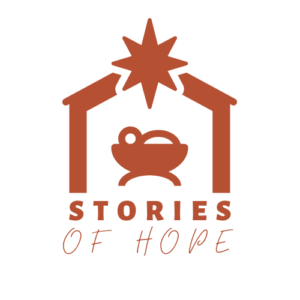
What Brings You Hope?
Hope is an optimistic state of mind that is based on an expectation that things can get better tomorrow no matter how tough they seem today. Why is the original Christmas story considered such a source of hope to so many people around the world today? As Christianity Today explains ‘When Jesus was born over 2000 years ago his birth announced the rescue many people at the time had been longing for. The name ‘Jesus’ literally means ‘to rescue’.’ It was believed that Jesus would come and rescue them from hopelessness.
That’s why it’s so important that we take the inspiration we find in the first Christmas story and help people find hope wherever they are. That first Christmas was a declaration of the good news for everyone. It was hope for shepherds and wise men alike. It was the hope that God hadn’t forgotten about the world he made. If the name Jesus really means rescuer; then Christians believe that we can still be rescued from hopelessness because of that first Christmas time.
How Can You Find Hope?
And so, in another year where the darkness sometimes feels more overwhelming than the light… Perhaps the greatest gifts we could give and receive this Christmas is hope. You probably have plans to give presents this year; But do you plan to give hope?
Why not try something to help you find hope and share hope this Christmas?
Talk to someone you trust if you are feeling hopeless
Why not find out more about the story of Christmas for yourself
Check out a Carol Service in your local community
Try a prayer of thanks to God for what you have that’s good in your life
Give someone a present who really needs cheering up… it doesn’t have to be expensive – it just needs to be thoughtful
Help out in some way in your community over the festive period – what can you do to serve others?
Can you think of 5 ways might you become a practical source of hope to other people this Christmas Time?
Five hacks for studying like a pro
Introduction
Whether you are a parent trying to support your young person to learn or a teenager trying to recapture the home learning vibe at the end of a long crazy term, this post will help you succeed like the best of the best!
Hands up if studying is starting to become dull, repetitive and dare I say it, boring? Do you find any excuse to walk to the kitchen, eat something (anything) or level up on Candy Crush? Well you are not alone in finding it hard to keep focus and get your work done.
So why is studying such a challenge?
Life is very different right now and we must find new ways of doing things, including how we study to reach our goals. We can easily read lots of articles about using our time to learn a new skill, language or get fit. All these are great ideas, but it can be hard to know where to begin. So if you are feeling as if you need some fresh perspective, here are 5 tips for studying like a pro.
How can I begin?
1. PLAN YOUR TIME
- Set alarms to remind you about your plan to study, it can be easy to get distracted by another activity.
- Think about the time of day that you work best in. Are you a morning person or do you prefer to start later in the day?
- Put things up on your wall to remind you of important dates and deadlines. This can also be useful for key phrases/dates/words that you need to remember. Post it notes are your friend!
- Learn to love a to-do list! This will help to break things down into manageable chunks and will stop you feeling overwhelmed.
- Set yourself time limits so that you don’t spend too long on one task leaving little time for another.
2. REMOVE DISTRACTIONS
- Change where you study every so often, particularly if you are finding it hard to focus.
- TV, it’s too easy to watch just one more episode and before you know it the day has gone. Instead use it as a reward for your efforts.
- Leave your phone in another room, constant notifications can be very distracting and tempting to reply to.
- People can be a big distraction, share you study plans with the people that are important to you. They will then be able to support you rather than distract you.
3. LEARN, REST, REPEAT
- Start your study session by reviewing what you did previously. Repetition helps to secure memories, helping you to feel confident about moving on to the next task.
4. MOVE AROUND
- Physical exercise can help you to focus and stay on task. It can also improve your Mental Health, even if it’s just a walk around the block regularly.
5. SLEEP
- Sleep gives you energy and boosts your immune system helping your body recover from Illnesses.
- Rest your mind, sleep helps your brain to recover and revive itself, storing your memories and creating new ideas. Important when studying.
- Sleep allows your mind to unwind and de-stress. This allows your mental and emotional wellbeing to be restored.

What can I do next?
- Get organised, set yourself a goal and use our top tips to help you get there.
- Get help! Talk to the people around you, get them on board to support you. From bringing you drinks to just not distracting you, there are lots of ways to help.
- Be kind to yourself! Sometimes things don’t go to plan or we have a bad day, don’t use this as an excuse to give up but start again tomorrow instead.
Want to explore more?
Lessons to study skills, find lots of useful stuff on BBC Bitesize.
Top advice on how to get that all important sleep you need.
Feeling stressed out by exams and need some advice?
Our Virtual Chaplain says…
Christians believe that God always has your back! If God really is interested in your life and all the tiny details, then that includes exams and your future. This verse below reminds us that when our trust and confidence is in God, we will never fail to have successes even through the difficult times and worries of studying towards an uncertain future.
But blessed is the one who trusts in the Lord, whose confidence is in him. Jeremiah 17 V 7
Help your teen become a resilient learner
Introduction
Even though our young people are back in school, everything looks very different with social bubbles, mask wearing and one-way systems adding an extra dimension of challenge to the so called normal school day. In this context it would be easy to shrink back and feel overwhelmed by the times we are living in and write off this as an academic year when no learning will really take place. Sometimes teens can get dragged down by what is going on around them and feel less than enthusiastic to focus on our studies.
However, the good news is that we can help them to see things differently if we choose to change our own perspective first. What if this year could make our students and not break them? It is still possible for them to become resilient learners despite the challenges we all face together. To get through we will need to help them adopt what the experts like to call a growth mindset so they can succeed.

So, what is a growth mindset?
According to educational research by Dr Carol Dweck, a fixed mindset is when people believe their basic qualities, like their intelligence or talents, are fixed traits. A person with a fixed mindset spends their time documenting, proving, or complaining about their own talents instead of developing them. They see problems happening around them as limit to the success. This kind of person does not do well when things don’t seem to go their way.
In a growth mindset, people believe that their basic abilities can be developed through dedication and hard work—raw talent is just the starting point. They also see their circumstances as something they can overcome. This mindset creates a love of learning and a resilience that is essential for progress. It helps people engage with subjects and activities that they may otherwise try to avoid through fear of getting things wrong or “not being good enough”. Having a growth mindset is right at the heart of becoming a resilient learner and is needed during this pandemic more than ever!
Our Top Tips for you
Here are 10 practical ways you can help your teen adopt a growth mindset that will help them thrive in their learning this year regardless of what is going on in the world.
1. Encourage your child to try something new
Even when facing difficulties around us, trying new things can open amazing opportunities. This can be challenging as we often worry that we won’t complete the activity perfectly first time around. Here’s the thing – no one gets it right from day one. Just make sure there is a day two! Growth-minded people learn how to constantly create new goals and find new opportunities to keep themselves stimulated.
2.Raise your expectations
It is commonly believed that lowering our expectations promotes self-esteem in children (e.g. “never mind, let’s try an easier one”), but this is not the case. Having high expectations shows that you believe they can do it, which in turn has a positive impact on their own beliefs, behaviours and outcomes.
3.Learn about learning
It always takes time to learn. Think realistically about time and effort. Don’t expect to become a master overnight and don’t expect it of your children straight away. Help them see where they are on the journey. What is the next step for them? Learning fast isn’t the same as learning well, and this sometimes requires allowing time for mistakes. Value growth over speed.
4.Help your child receive feedback
Teach and model that criticism can be a means of growth unless it is a personal attack. We are not talking about bullying or trolling here! Often we can fail to distinguish between downright negativity from haters and people who want to help us grow. Feedback is our friend. Recognise if you are being defensive and try to listen to understand. You don’t have to accept everything someone says… but you can still learn from it!
5. Don’t be afraid to tackle big challenges
According to someone with a fixed mindset, if you fail at something, make a mistake, or even have to put effort in, it must be because ‘you’re just not good enough’. Because of that belief, children begin to avoid challenges and choose activities that they find easy. Instead model it as an adult first… Why not try to tackle big things with the elephant analogy. How do you eat an elephant? One bite at a time!
6. Learn to see failure as a stepping stone
Teach your child that failure is an opportunity to grow not the limit of their abilities. Hiding from weaknesses means you’ll never overcome them. Believing that your qualities are carved in stone creates an unhealthy urgency to constantly try to prove yourself to others. Instead ask yourself – “What can I do better next time?” In other words… fail better.
7. Celebrate the success of others
Decide not to be threatened by the achievements or success of others but rather see their gain as your inspiration to keep going. Think about a favourite athlete, musician or artist and talk to your child about their journey to success. This unravels the so-called talent myth. If someone has done well, we tend to think they were born that way. We need to demonstrate that this is not the case. Rather than focusing on somebody’s ‘natural talents’, focus on early efforts, a strong work ethic, and the mistakes and learning that led them to where they are now.
8. Use the language of the resilient
Don’t rush to let your child say – I CAN’T. A change of language and mindset may look like this:
- “I am not good at this” becomes “what else do I need to know?”
- “This is too hard” becomes “this may take a bit of time…”
- “It is good enough” becomes “is this my best work?”
- “I give up” becomes “I need to think of a new strategy…”
Introduce the word YET. Remind children they just don’t know it or can’t do it YET.
9. Be conscious in HOW you praise
Praise is really important for children but what you celebrate really matters! Offer praise and reward for effort, progress and learning from a mistake not just for displaying natural talent. Reward actions, not just traits. Tell your child when they’re doing something smart, not just being smart. Make sure praise is consistent, specific and memorable! Your encouragement will make all the difference.
10. Build in time to reflect on their learning
Provide regular opportunities for reflection on what your child is learning at school. It can be really tough to focus at times, but as we as parents and carers become more resilient whatever the next season throws our way!
And finally… be kind to yourself and your children. We have not lived through this kind of stuff before. But we can get through it together.

Our Virtual Chaplain says…
There is a really helpful verse in the Bible that is an encouragement to stay resilient in times of challenge. It reminds us to “not grow weary of doing good, for in due season we will reap, if we do not give up.” The illustration of a harvest is a great way of thinking about our learning and our life – what we sow today will produce fruit tomorrow… so keep going – and keep sowing! You are doing a brilliant job!
Bible Reference: Galatians 6:9
How to improve your wellbeing during Lockdown life
Introduction
As we enter another period of restrictions due to the Coronavirus, it is vital that we continue look after our mental as well as our physical health. Hands – Face – Space – is good advice for our personal hygiene, but it doesn’t account for the personal challenges we face on the inside.
As a parent or carer, we can easily slip into a mode where we are so busy looking after everyone else that we forget to think about ourselves. Daily doses of bad news seem to knock us back and it can be harder than ever to keep on our feet. Teenagers can be so busy trying to figure out what and why things are so tough right now that everyone’s’ wellbeing can be affected in a negative way. Knowing how to manage and improve our mental wellbeing is one way we can make it through the challenges that lie ahead for us all.
So what does wellbeing mean?
Wellbeing is defined as your mental state – how you are feeling and how well you can cope with day-to-day life. It is about the connection between our bodies and health, our relationships, our mind/thoughts, and our emotions/feelings.
PHYSICAL + SOCIAL + MENTAL + EMOTIONAL= WELLBEING
EVERYTHING IS CONNECTED! Good wellbeing enables you to get the most out of life. It helps you to benefit others and your community. It enables you to THRIVE and not just survive!
Here are our top tips
1. Understand that life can be a rollercoaster
We all experience ups and downs of life that impact how we feel at certain times. Everyone deals with situations differently. What is easier for one person may be harder for another and that is okay. Some circumstances in life leave us feeling like we are heading up; like making new friends, going on holiday, or receiving an award. Other situations can make us feel low: like the thought of another Lockdown, a loved one becoming ill or experiencing discrimination from others. Just like being on a rollercoaster, some experiences can leave us with a mixture of excitement and dread at the same time: such as moving to a new house or starting a new job. It is normal not to feel perfect all the time! The GOOD NEWS is that no matter where feel you are at right now, there is ALWAYS hope! You can learn to live beyond the ups and downs of our circumstances. There are so many practical ways we make a difference even in the middle of lockdown life.
2. Learn to spot the warning signs in yourself and others
Just like that warning signs that appear on the dashboard of a car, there are often warning signs we can learn to spot in ourselves or those very close to us that indicate we may need to pause, make a change or ask for help.
PHYSICAL SIGNS (How your health is) When our wellbeing is poor, we can be affected by things like stomach upsets, low energy, changes in appetite, random aches and pains and disturbed sleep.
MENTAL SIGNS (How you think) We can be impacted by negative feelings, confusion, reduced concentration, consistent negative patterns of thinking and anxiety, fear, or suspicion.
BEHAVIOURAL SIGNS (How you act) We can be affected by things like mood swings, emotional outbursts, strong feelings of blame, lower performance, and uncharacteristic behaviour.
Everybody will experience some of this at different times and it doesn’t mean there is something majorly wrong with us or others! It’s just good to be able to recognise when things aren’t doing so well, so that we can help ourselves and others to take the right steps to improve wellbeing when we need to.
3. Follow the expert Advice
There are five simple bits of expert advice that are known as The Five Ways to Wellbeing. Here is quick summary taken from advice by The New Economics Foundation.
- Connect with the people around you: family, friends, colleagues and neighbours at home, work, school or in your local community. Think of these relationships as the cornerstones of your life and spend time developing them. Building these connections will support and enrich you every day. You can do this even if you can’t see them in person.
- Be active: Go for a walk or run, cycle, play a game, garden or dance. Exercising makes you feel good. Most importantly, discover a physical activity that you enjoy; one that suits your level of mobility and fitness.
- Take notice: Be observant, look for something beautiful or remark on something unusual. Savour the moment, whether you are on a bus or in a taxi, eating lunch or talking to friends. Be aware of the world around you and what you are feeling. Reflecting on your experiences will help you appreciate what matters to you.
- Keep learning: Don’t be afraid to try something new, rediscover an old hobby or sign up for a course. Take on a different responsibility, fix a bike, learn to play an instrument or how to cook your favourite food. Set a challenge you will enjoy. Learning new things will make you more confident, as well as being fun to do.
- Give: Do something nice for a friend or stranger, thank someone, smile, and volunteer your time to help those less fortunate than you. Look out as well as in. Seeing yourself and your happiness linked to the wider community can be incredibly rewarding and will create connections with the people around you.
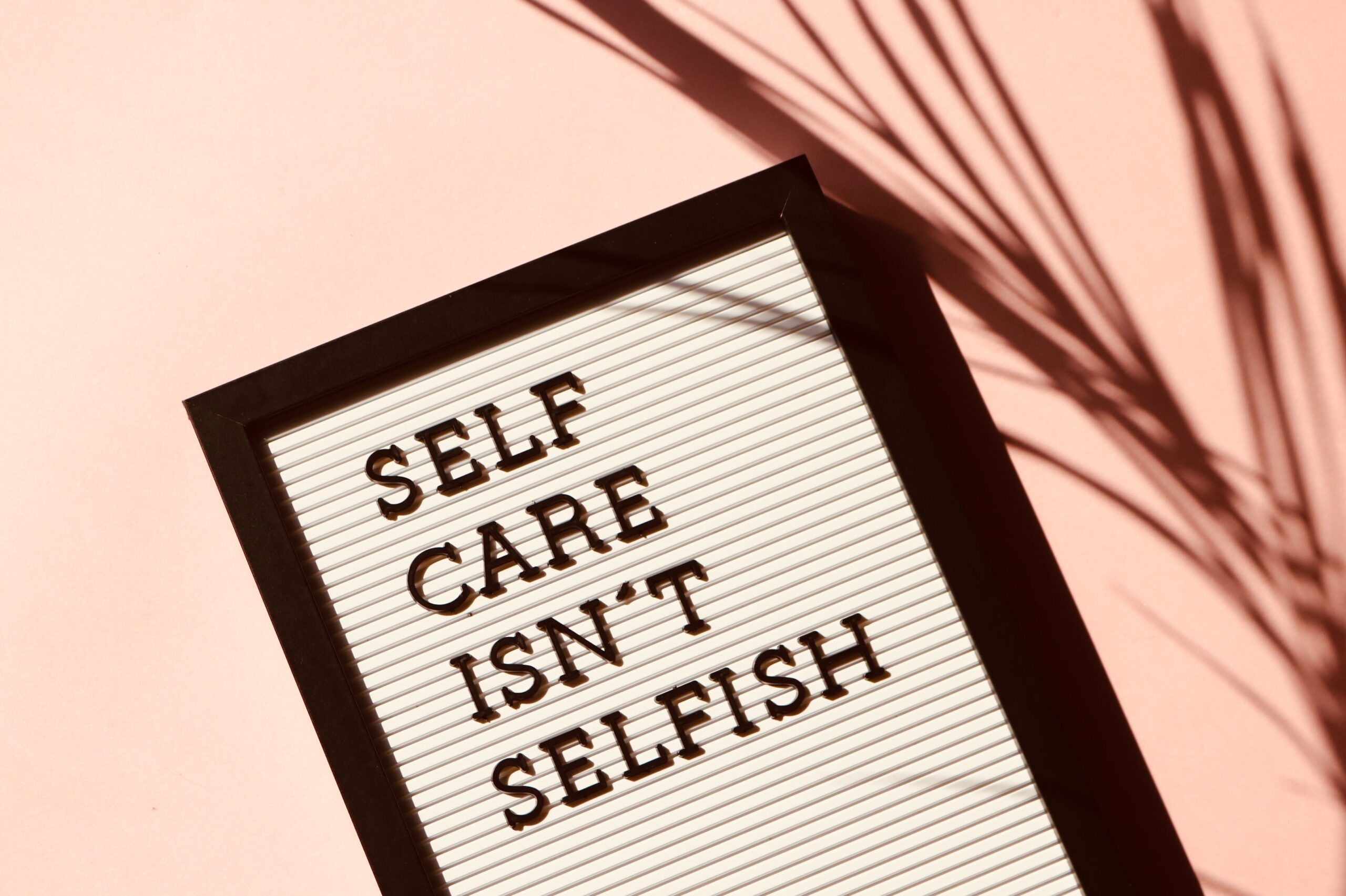
What can I do now?
Why not sit down and make a STOP START CONTINUE Plan… Think about the concepts of Connect, be active, take notice, keep learning, and give. Simply ask yourself questions in relation to the Five Ways to Wellbeing. Plan for yourself – and then why not try planning with family too? Many of these changes can be made in spite of the restrictions put on us during a pandemic.
What will you stop? | What will you start? | What will you continue?
Some examples of an action plan may include:
- I will stop going on my phone after 8pm…
- I will start walking the dog more…
- I will continue talking to my friends when I struggle
And so on… What can you do today to make a difference?
Our Virtual Chaplain says…
In the world of Covid-19 that we are currently living in, it feels as though the rollercoaster of life can leave us feeling spinning out, as we are living in such uncertain times. In the Bible there is a great little prayer that we can pray for ourselves and others in those difficult times where our wellbeing may be affected. A man called John wrote a letter to a community he knew well as said these kind words that act as a reminder that our health is connected – mind, body and spirit:
Dear friend, I pray that you may enjoy good health and that all may go well with you, even as your soul is getting along well.
Why not take time to pray for good health, good relationships and a healthy soul – this is a great prayer to try for ourselves sometimes…and definitely something we can pray on behalf of others.
Bible Reference: 3 John 1:2
How to Stay Resilient During the Covid Crisis
Introduction
As much as we hate to admit it, deep down we know that sooner or later life is going to confront us with change or difficulty of some kind. It is simply an unavoidable part of the wonderful package we call life! That’s why it’s a no-brainer that one of the most valuable traits we can build into our character is the ability to adapt and overcome when challenges hit. AKA: Resilience.
So what is Resilience?
Resilience basically means ‘to rebound, recoil, or spring back’. In other words, it is the ability to withstand or recover from significant challenges that would otherwise threaten to knock you off course.
Why is Resilience a superpower?
Life will always give you lemons, however you can always overcome!
Like we’ve already said, there’s no getting around the fact that in life, hardships will come. But we don’t have to let it catch us off guard! Remind yourself that ‘You may not be able to control the situation, but you are ALWAYS in control of you.’
Resilience gives space for gratitude.
This doesn’t mean denying there is difficulty, or pretending that nothing bothers you. Rather, it means acknowledging the challenges, but instead of allowing them to be the ONLY thing you focus on, looking for the positive opportunities too. Practising gratitude can be a great way to help build this into your mindset.
Resilience enables you to support others.
By practising resilience, you will not only be better prepared to face difficult situations yourself, you will be able to offer strength and support to those around you who may be struggling too!
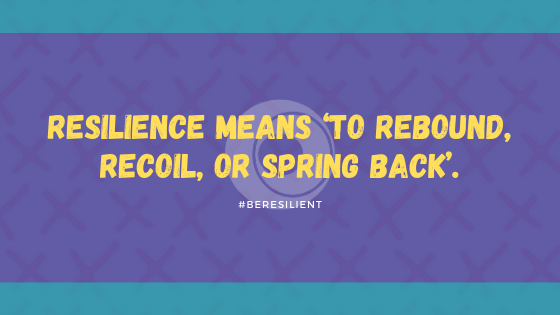
What can you do? Consider a current challenge or difficulty you are facing…
Try to think about 3 things you can be thankful for in spite of the situation, rather than just focusing on the negatives.
When considering the challenges you’re facing, make a note of 3 actions you can take to help create a more positive outcome in the given situation.
Think of one person in your life who you think is good at showing resilience. If you can, have a conversation with them this week and ask how they have become so resilient in life.
Want to explore more?
It might not always be possible to stay resilient (we’re only human!) and sometimes challenges we face may feel overwhelming or too much for us to handle. If this is the case, don’t be afraid to reach out to others for help. Young minds is a great organisation who can help if you or others in your family may be struggling with your mental health. Visit YOUNG MINDS to find out more
Our Ethos Blog may help you gain some fresh perspective. Visit the Ethos Blog
Our Virtual Chaplain says…
“The Bible offers many words of hope and comfort to us in difficult times, such as promises of God’s love, strength, and nearness, which can give us the encouragement we need to stay resilient when facing difficult situations. One of the New Testament writers, Paul, also explains that “endurance produces character and character produces hope” reminding us that as we learn to persevere through challenges, our character becomes stronger, and so does our hope!”
Bible Reference: Romans Chapter 5 vs 4
How to tackle feeling stressed out today
Introduction
Stress can be something that all of us face in our lives and it shows itself in different ways for us all. There are so many triggers whilst we are in the middle of a global pandemic. Sometimes we find it hard to immediately recognise when stress is causing us a problem because it isn’t always obvious and hides itself! We forget that there is probably a connection between physical warnings, such as tense muscles, over tiredness and headaches and the pressures we are facing right now. When stress starts to impact both our emotional and physical health then it is time to pay attention.
So what is stress anyway?
Stress can be defined as the degree to which you feel overwhelmed or unable to cope as a result of pressures that are unmanageable. Mental Health Foundation
In the world of Covid-19 that we are currently living in, it feels as though stress can be difficult to walk away from, especially as we are living in such uncertain times. There are however some practical steps we can take to help ease the burden and take more control.
To start to deal with stress we first need to review our lifestyle. Ask yourself some tough questions about whether you could be taking on too much. Can you do things at a different pace? Do you need to prioritise life in a different way?
Once you realise that stress is impacting your life you must try to identify the root causes. You might sort the possible reasons into three categories. – Those that have a practical solution – Those that will get better given time – Those you simply cannot do anything about! For those you identify are in the second and third groups – just pause for a second, breath and try and let them go for now.
William James, one of our most influential philosophers, once said ‘The greatest weapon against stress is our ability to choose one thought over another’. I believe this to be so true because even if we’re not able to control what is happening in the world around us, we can still control our own thinking.
Top tips for dealing with stress
I hope that these five quick practical tips will help PROTECT you from feeling too stressed in the future.
EAT HEALTHILY
There is a growing amount of evidence that food can affect our mood so try and eat as healthily as possible.
EXERCISE
This is such an effective way of relieving stress, even if you go for one short walk a day outside or take a trip to the park.
TAKE TIME OUT TO RELAX
Strike the balance between your responsibilities and priorities; making sure you prioritise self-care! This will often help you find a simple solution to the problem you’re feeling so stressed about.
GET SOME SLEEP
Try and have a healthy sleep pattern! Perhaps you can journal your thoughts before you sleep to help your mind to relax and not run in overdrive.
DON’T BE TOO HARD ON YOURSELF!
Try and keep things in perspective, be kind to yourself and look at the positives in life.
Remember in all of this, you are not alone! A recent survey showed that 74% of people felt stressed and overwhelmed at some point over the last year. We can get through this together!
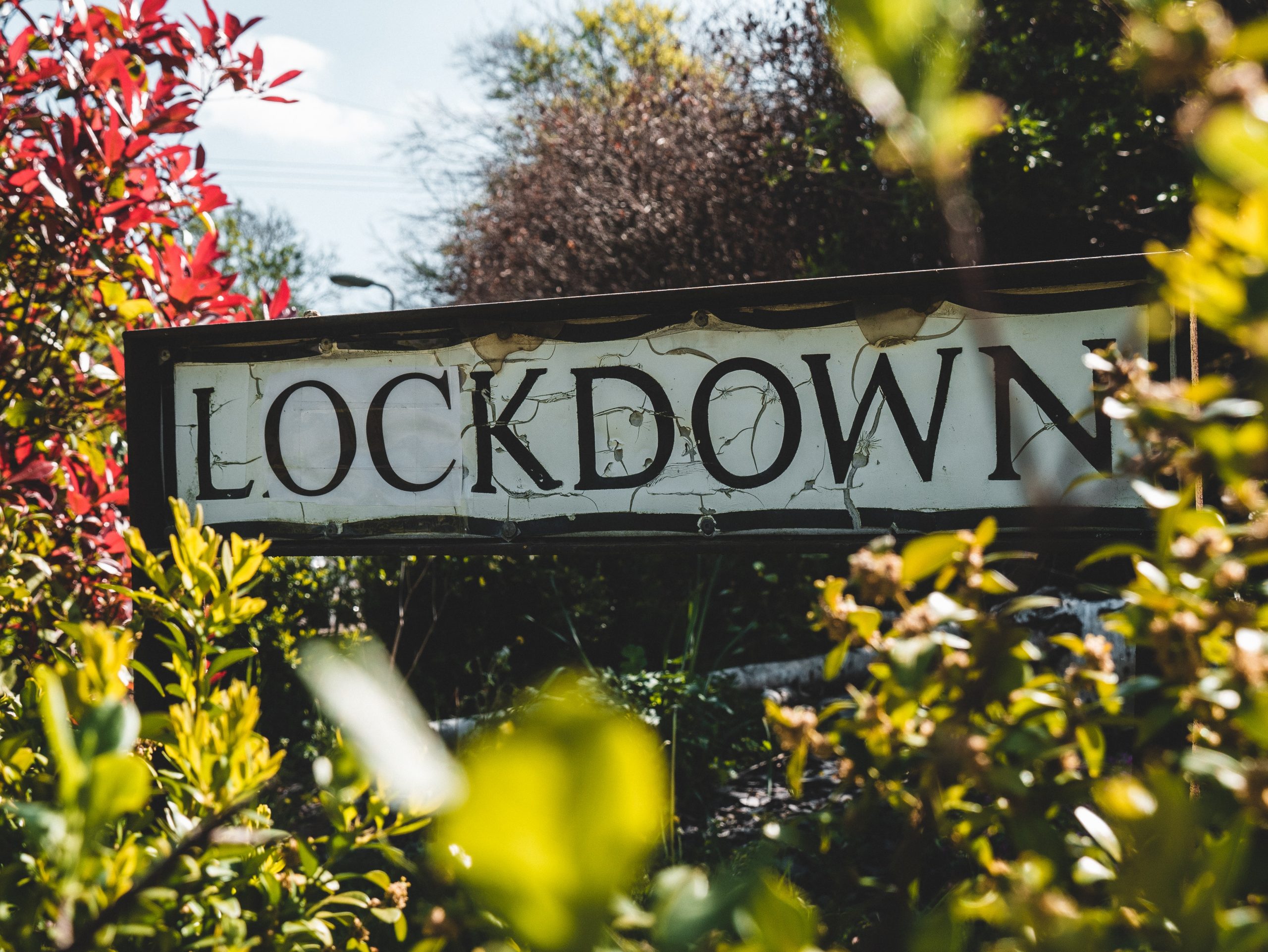
What can you do now?
Why not try sorting the possible reasons for your stress into three categories/lists. – Those that have a practical solution – Those that will get better given time – Those you simply cannot do anything about! What does this list prompt you to do next?
Put into action today at least three practical steps that could help with your stress levels!
What can you do to take some time out for self-care today? What does self-care look like for you?
Want to explore more?
SAMARITANS are a brilliant charity if you’re feel like you need to chat to someone urgently or need confidential support. Call a member of their team: 116 123 (free 24-hour helpline) or visit their website.
MIND is a great organisation with lots of advice and tips. You can chat someone in their team: 0300 123 3393 or visit their website.
Our Virtual Chaplain says…
“Many people in times of stress, may turn to God and ask for comfort. The Bible says ‘Don’t worry about anything; instead, pray about everything. Tell God what you need and thank him for all He has done’. Often Christians pray during stressful times and they say it helps them to feel calmer to deal with everyday life. The feeling of peace that comes from asking God for help can really make a difference in your life.”
Bible Reference: Philippians 4 v 6
Love Has the Last Word
Introduction
This year’s Grace Foundation Easter theme is ‘Love Has the Last Word’ and in our Partner Schools will be exploring with students what this means through lessons, Assemblies, Tutor Time and Enrichment activities as part of the RE Curriculum.
Here is a short film that explains what Christians believe about the significance of the Easter Story created by our Ethos Leaders.
The kind of love that Christians are excited about in this film isn’t conditional like we see in most romantic films from Hollywood or read about on social media. It’s the kind of love where we can come as we are – not needing to pretend to be someone we are not and one that offers complete acceptance.
This love has made a huge difference in the lives of people all over the world. As Bear Grylls, well-known TV Adventurer puts it:
“To me, my Christian faith is all about being held, comforted, forgiven, strengthened, and loved.”

Or as the late Queen Elizabeth II described it in one of her famous Christmas broadcasts:
“The light shines in the darkness, and the darkness has not overcome it’… Despite being displaced and persecuted throughout his short life, Christ’s unchanging message was not one of revenge or violence but simply that we should love one another.”
Easter is a Story of Love
The Christian week (called Holy Week) leading up to Easter is a journey filled with many rollercoaster emotions. On the day before ‘Good Friday’ (known as ‘Maundy Thursday’) leading up to Jesus’ death, Jesus meets with his followers for what is known as the ‘last supper’ – it is a meal filled with uncertainty as Christians await the hopelessness of Jesus’ death on Good Friday. But then this confusion turns to joyful expectation through the hope that the resurrection on Easter Sunday brings.
And this is, for Christians, what Easter celebrates – a man called Jesus who entered the world and showed sacrificial love to everyone. It’s the kind of love that has the very last word in a world that whilst has so much joy within, also bares much pain.
Whether you believe the Easter Story or not we can all take heart from what love can really look like in our day-to-day lives. Love is what is needed right now more than ever. As it says in the Easter film… everyone is looking for:
- Peace over anxiety.
- Kindness over hate.
- Gentleness over anger.
- Generosity over selfishness.
- Forgiveness over cancel culture.
- Joy over despair.
Here are a few ways you – whether students, staff, or family in one of our Partner Schools – can show love to others:
- Stand up for someone who needs a friend.
- Start a petition or write a letter about an injustice I see in the world.
- Support a local charity e.g. donating old clothes or volunteering.
- Leave an encouraging note for someone who seems lonely.
- Give a Chocolate Egg to someone I don’t know well.
- Thank a Teacher for all they do.
- Do something kind for someone, anonymously!
- Try praying for someone in need.
May Love Have the Last Word in all our lives this Easter 😊
Love Has the Last Word – Our Easter Campaign
The Gift Of Giving
Social action is about the coming together of people with the aim to improve the well-being of their communities. It can involve various activities that make a positive difference to others in the form of volunteering, fundraising, community action or simply, performing neighbourly acts.
Knowing the benefits ‘acts of giving’ has on one’s mental, emotional and spiritual well-being, Grace Foundation wanted to provide an opportunity for students to practice one of our primary learning themes, Growing By Serving Others.
Our Revolution Manchester 2022 Residential did just this, and so much more.
“I learned that helping people makes everything feel a bit better” – Elizabeth Woodville School student
From 27-30 June 2022, 49 students and 16 staff from Rushden Academy, Grace Academy Coventry, Grace Academy Darlaston, and Elizabeth Woodville School traveled to Manchester for a 4-day social action residential. In partnership with Audacious Church Manchester, various projects across the city were allocated to us to tackle over the course of our stay. We spent our time clearing gardens, painting and redecorating homes in preparation for new community members to move in, partaking in Youth Group-led Games Nights, and a highlight of the trip – serving at the Audacious Homeless Banquet.
“Handing out food to those in need and seeing how many there were made me understand how lucky I am and how helping those people makes a big difference” – Grace Academy Darlaston student
“The most significant part of the trip was helping fix the mother and son’s house because they’ve probably been through a lot and if I was able to help just a little bit” – Rushden Academy student
Not only did we have the opportunity to share our time, curiosity, and efforts with the communities of Manchester, students themselves were significantly impacted through the process. Some students had never previously had the opportunity to travel outside of their hometowns. Thus, with future prospects heavily in the minds of our Year 10-12 students, we partly aimed to broaden the scope of ‘what if’ and ‘where’ in these developing thoughts of where life is going to take them.
As well as this, bringing students together from our different sites encouraged new social interactions and friendships to develop over the course of the trip. We have been so encouraged to see how these have impacted the social confidence of many of the students post-trip.
“I learnt that I can build friendships with different kinds of people” – Grace Academy Coventry student
“My social skills are better than I thought, I just need to trust myself!”
Positive feedback from our staff and students is one of our biggest motivators. It has been warming to receive feedback we have, from the community members of Manchester whose gardens and homes we worked in.
Team EWS were assigned a garden project for the two days of project work. The tenant suffers with long COVID, leaving him struggling for breath if he walks more than a few metres and he had previously been an avid gardener, but his ill health has rendered him unable to do any physical labour. As a result, his garden had become extremely unruly and sadly, resulted in an eviction notice.
Below is a message received by EWS from the man’s son, following the completion of the students’ hard work.
“Good afternoon. I just wanted to pass on my sincere thanks to yourselves and the youngsters who have helped my dad clear his back garden. I know my cousin brought the matter to your attention and she has also been helping him as have I when I’ve been able to but struggled due to living in Wigan, working and having a 3-year-old to tend to. It was so heart breaking to see the state of my dad’s house and outside areas and the fact he had clearly let it get on top of him to the point he fell into really bad depression. It took a lot of persuading from me and my family to finally convince him to let us all in to help. To see those photos of the work yourselves and the youngsters have done is absolutely overwhelming and I really can’t thank you enough for your efforts. Please pass on my personal thanks to all involved. This will certainly help my dad’s wellbeing and he will finally be able to have his grandson go to his address and play in his garden. He hasn’t been able to visit before until recently, so I know my dad seeing my son at his house undoubtedly makes him happy. Again, my sincere thanks to all of you.”
Grounded by Gratitude
We are so appreciative to the staff, external partnerships, sponsors and every other community member who made this opportunity the success it was. Better together is yet again proved by our staff and students. We look forward to see what Social Action Revolution 2023 holds… stay tuned!
One key that can help us beat racism
Introduction
As we have looked again into the issue of racism as a society it might be easy to wonder what we can really do to respond to such a complex issue. Although we didn’t realise until afterwards, our previous post on racism (read it here) was released at the same time as World Empathy Day took place. This is an international celebration through which people are encouraged to focus on understanding each other more. This coincidence is significant because it reminds us how we can all start to tackle injustice.
What’s one thing that can help us beat racism together? We can harness the power of empathy.
So what is Empathy?
Empathy is our ability to understand another person and feel their emotion. In other words, it is about trying to put yourself in someone else’s shoes. Showing empathy has been described a force for change because when we feel for people, it makes us want to help people.
It is interesting to note that new scientific evidence shows the power of reading to help us build real-life empathy skills. Research from the Empathy Lab says that 98% of us can train our brains to become more empathetic by reading and listening to other people’s stories. As we read about other people’s experiences, we are invited to share genuine emotions for people we don’t even know in real life. Empathy is a vital human force that can create stronger communities and a better world.
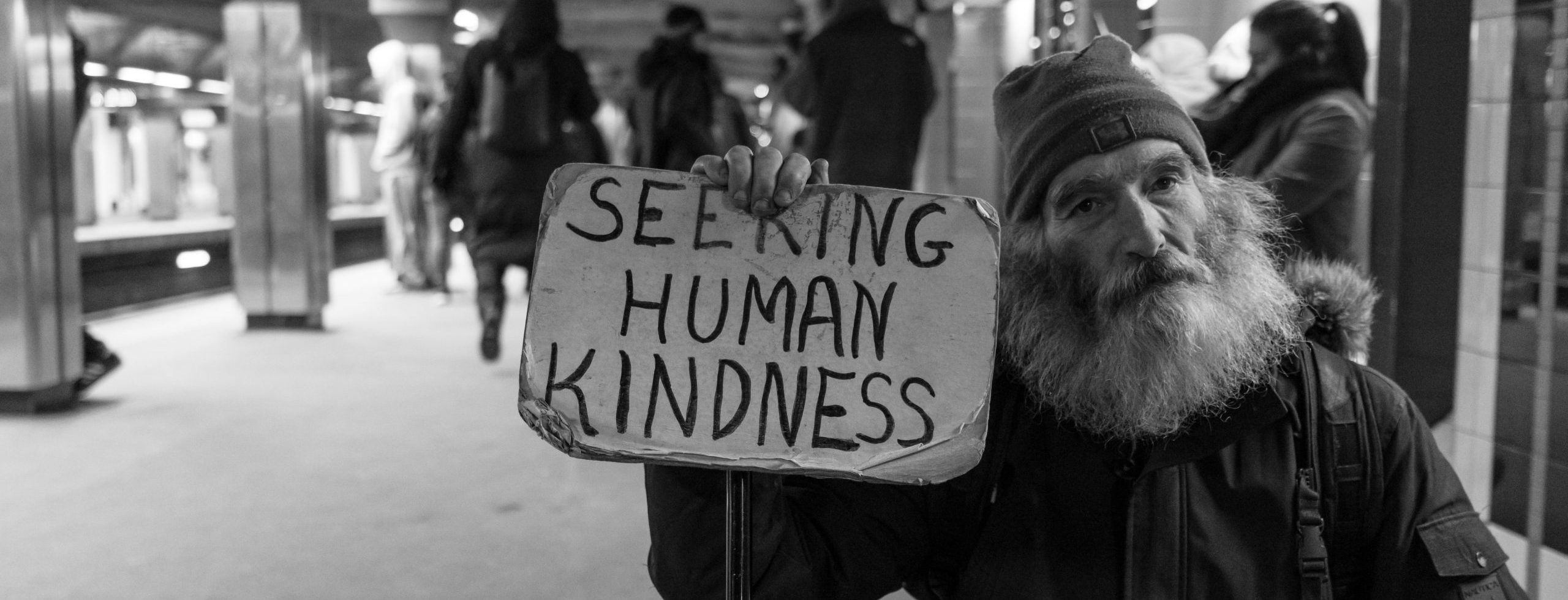
How can we respond?
We believe empathy is a skill that can be developed as a revolutionary force for change if we put it into action. Imagine you have an Empathy Switch in your head. Switch it on! This will help you deal with:
- How we resonate with someone else’s feelings
- Thinking about a different perspective than our own
- Showing concern for others even if we don’t know them personally
“Empathy is a quality of character that can change the world.” Barack Obama
Empathy helps us stand up
A Year 7 student from Grace Academy Solihull was recently inspired to write a poem in memory of George Floyd called Dear America. In the poem they wrote passionately about what it must have felt like to be oppressed.
“How does it feel to be disrespected in a place that you call home? In a city with over one thousand citizens, is it right to feel alone?”
They finished their poem by calling for change in America and beyond:
“This way of living is pathetic, the injustice can no longer go on. Which is why millions across the globe begin to sing this song. A song of pleading, imploring and demanding that rights are respected for all. That we should be democratic, no more riots or brawls.”
This idea clearly demonstrates the results of empathy in action. Their creative response is an incredible example of what happens when we find a way to use our voice to show empathy for others. What if we all did the same?
To bring about change, you must not be afraid to take the first step. We will fail when we fail to try. Rosa Parks
Empathy helps us speak out
In our latest ETHOS YouTube video Daniel from Grace Foundation shares his difficult experience of racist bullying as a child. He talks about how much of an impact this had on him and how he wants to help others overcome. Daniel finishes by reminding us that hope for change comes when we start by listening, learning and leading whoever and wherever we are.
Not everything that is faced can be changed, but nothing can be changed until it is faced. James Baldwin
What can you do now?
Take time to read, watch or listen to the experiences of someone who has experienced racism. What can you learn from their story?
Make a practical list of all the ways you can show empathy to others around you this week.
Decide on a creative way you can use your voice to help stand up for justice for others. Could you write a poem, share your story, make a film or record a song?
Want to explore more?
Racism can affect anyone. If you need to talk to someone about how it has impacted you and need to find out more please visit here.
In this short video we are visually reminded of the meaning of the phrase “to put ourselves in other peoples shoes”.
In this clip a student midwife from North Yorkshire powerfully speaks out about the racism she received when at school and university and how she wants to bring change.
Evey Gordon said with “everything going on in the world” she wanted “to say something” to explain what it was like growing up mixed race in the city. She wrote this poem as part of her response.
Our Virtual Chaplain says…
When we take time to work out what our motivation for helping others really is we can become a force for change. Martin Luther King Jr once said “Darkness cannot drive out darkness; only light can do that. Hate cannot drive out hate; only love can do that.”
This is a reminder of the heart of the Christian message that love is what transforms our world. When we don’t know what to do in the complexity of our day, we just have to remember the golden rule to love our neighbour as ourself. And if we all put that into practice it would help us beat hatred altogether.
‘Love your neighbour as yourself.’ No other commandment is greater…”
Bible Reference: Mark 12 v 31
Parenting under pressure
Finding pandemic parenting hard?
A recent National survey highlighted the very real challenges thousands of parents are facing as they struggle to cope in lockdown. The findings showed that four out of ten parents are feeling anxious and one in ten admitted to being out of their depth when it came to parenting during the pandemic.
Many parents are experiencing the same level of mental health challenges, lack of sleep, and feelings of loneliness that their children have, leaving them clueless about how to help.
Though it highlights the many hurdles we all must overcome right now, at least this survey reminds us we are not alone. In this blog post we will take time to explore what causes pandemic pressure and how we can find hope in challenging circumstances.
So, what causes all the pressure to build up?
It is important to stand back and recognise that we really are parenting in crazy times. Life before the pandemic seems a distant memory right now. The pressure on us all builds up in us right now from many different angles all at the same time.
Parenting Pressure due to Constant Change: With so much change and uncertainty about what is happening due to Covid, it can be hard to make plans for tomorrow let alone think about the long-term impact of what is happening right now.
Parenting Pressure due to Media Messages: The messages on the news and online offer endless charts with scary figures, conflicting opinions about a way out, and seemingly constant changes to how things might look tomorrow. The mixture of real news and fake news leaves us feeling on edge. The very real facts about the health consequences of catching Covid-19 can be a deep cause for concern.
Parenting Pressure due to practical struggles: Managing the household for many parents has become a real sticking point. Many are feeling like you must look after young children, home school teenagers like an expert and even work from home all at the same time. Some parents are finding it extra hard to try and please a boss as well as communicate with a school teacher, manage tech time and figure out what the next meal on the table is going to be!
Parenting Pressure due to concerns over our children: Parents in the National survey reported worrying signs in their children under 18 such as ‘bedwetting’, becoming ‘clingy and unsure’ and not ‘wanting to go outside’. Others reported ‘disordered eating’, and that their child had become ‘weepy’, ‘frustrated’ or ‘scared of people’ outside their home. If your child’s behaviour consistently deteriorates to a worrying level – it can be time to ask for help.
All this parenting pressure could lead to sense of hopelessness yet thankfully there is always a light at the end of the tunnel. One of the most important things to remember in times of crisis is that there is so much we can’t control but it is helpful to focus on what we can.
There are some practical steps to take that can help relief the pressure valve and help us make it through.

Our Top Parenting Tips For You
1. KEEP IT SIMPLE
Life is not the same right now so we cannot expect to go about business as usual. We so often place unnecessary huge expectations on ourselves to either function as we normally did before the pandemic or perform at some super human level. Sometimes it is fine to go back to basics and ask yourself what is the most important thing right now? We can’t do everything – so figuring out the simple priorities helps us keep moving forward. It may even help to get a piece of paper and write down everything going on in your world right now to help you bring a sense of order and know what to do next.
2. KEEP A ROUTINE
As the external pressures build up, our internal lives can end up in a right jumble. One of the ways to navigate out of feeling chaotic is to create a consistent plan for how your day looks. Experts say that keeping your routine — whether a new one or the one you had before the pandemic hit — is an important part in helping maintain your mental and physical health. Creating boundaries around working spaces and putting in time slots for different parts of your day can really help. Establishing a healthy routine can help offer something that’s not easily found right now: a small sense of certainty. It also helps avoid that feeling you get when it is almost like you are stuck in-between Christmas and New Year period and have no idea what day it even is!
3. KEEP IT HONEST
What we model to our children makes all the difference. Sometimes you need to admit you are struggling and talk to someone you can trust before your children will do the same. There are many organisations that offer emotional, mental and practical support. You can chat to a friend or family member or talk to someone you trust at school or work. Try to phone one of the many useful helplines that help you cope when you feel overwhelmed. There is a helpful analogy that if an emergency occurs on a plane, you need to put your own oxygen mask on first, before attempting to help those around you. Thinking about this, you might instinctively think this is selfish, but it is the best thing you can do to help others.
4. KEEP TALKING
Creating opportunities to connect and talk with your children is vital in this season of change. Listening is the heart of communication and so often as parents we forget that we are not meant to do all the talking! Doing practical things together helps break the deadlock when you feel like you are not connecting well with a teen. Sometimes being “alongside” a young person is less intense than face to face and basic small talk that leads to real talk over time. Remember a teenager will rarely want to talk on your convenient schedule. Be prepared to pause what you are doing when you see signs they want to connect. Validate your children’s feelings and acknowledge without judgement how they are really doing right now. Remind them that this is not forever and there is light at the end of the tunnel.
5. KEEP GOING
One of the rare memorable moments of joy during 2020 was seeing Captain Tom Moore walking laps in his garden. On 6 April 2020, at the age of 99, he began to walk in aid of NHS Charities Together, with the goal of raising £1,000 by his hundredth birthday. During the 24-day course of his fundraising efforts he made many media appearances and became world famous. His fundraising efforts attracted over 1.5 million individual donations that have raised up to £40 Million pounds. It was incredible to see this elderly man keep walking step by step rising above every barrier he faced. And it is a great reminder that we can do the same. Even though the road feels long and winding, we will only get there if we move one step at a time. So above all else, keep going – whatever you are facing right now – because in the words of the amazing Captain Tom… Tomorrow will be a good day.

Useful Links
Need to talk now? Whatever you’re going through, a Samaritan will face it with you. They are here 24 hours a day, 365 days a year. If you need someone to talk to, they will listen. They won’t judge or tell you what to do. Visit their website for how to get in touch today here.
Want to find useful information? Visit the Family Support section on our Ethos website to find a range of links, helplines and support relevant to your circumstances right now.
Need more help? If you relate to a Grace Foundation Partner school, such as ones in the Tove Learning Trust, our Family Support Workers are here to provide advice, support and information to help you make the right decision at the right time to get support for you and your family. Please contact the Ethos Team in your school today.
Our Virtual Chaplain says…
In the Bible there is a verse that reminds us how a hopeful approach can get through any difficulty we face. Even when things get tough, if we keep our focus on hope, it gives us the patient endurance to make it through. There may not feel a lot to feel positive and thankful for right now but finding a sense of hope will give us the confidence to know that a brighter day is coming; and that you and I will be stronger on the other side.
“Even in times of trouble we have a joyful confidence, knowing that our pressures will develop in us patient endurance. And patient endurance will refine our character, and proven character leads us back to hope.” Taken from Romans chapter 5 verses 4-5
In other words, our character gets stronger over time if we keep holding onto hope. So, what are you hopeful for today? Let’s always remember the truth of this quote by Sope Agbelusi who said: “Remember diamonds are created under pressure so hold on, it be your time to shine soon…”
Check out more resources on Hope via the Ethos Blog
Parents under Pressure: Part 1
You are doing an amazing job
Being a parent is hard. Being a parent in a pandemic is really hard.
Watch the first video in our new Parents under Pressure series below:
Our Virtual Chaplain says…
In the Bible there is a verse that reminds us how a hopeful approach can get through any difficulty we face. Even when things get tough, if we keep our focus on hope, it gives us the patient endurance to make it through. There may not feel a lot to feel positive and thankful for right now but finding a sense of hope will give us the confidence to know that a brighter day is coming; and that you and I will be stronger on the other side.
“Even in times of trouble we have a joyful confidence, knowing that our pressures will develop in us patient endurance. And patient endurance will refine our character, and proven character leads us back to hope.” Taken from Romans chapter 5 verses 4-5
In other words, our character gets stronger over time if we keep holding onto hope. So, what are you hopeful for today? Let’s always remember the truth of this quote by Sope Agbelusi who said: “Remember diamonds are created under pressure so hold on, it be your time to shine soon…”
Check out more resources on Hope via the Ethos Blog
Useful Links
Why not check out our other blog: ‘Parenting in a Pandemic’
Need to talk now? Whatever you’re going through, a Samaritan will face it with you. They are here 24 hours a day, 365 days a year. If you need someone to talk to, they will listen. They won’t judge or tell you what to do. Visit their website for how to get in touch today here.
Want to find useful information? Visit the Family Support section on our Ethos website to find a range of links, helplines and support relevant to your circumstances right now.
Need more help? If you relate to a Grace Foundation Partner school, such as ones in the Tove Learning Trust, our Family Support Workers are here to provide advice, support and information to help you make the right decision at the right time to get support for you and your family. Please contact the Ethos Team in your school today.
Parents under Pressure: Part 2
Taking care of yourself
Over this last year, many families have found themselves in difficult situations, which in turn can cause people to react differently to situations and family members.
Watch the video below for tips to help during this time.
Our Virtual Chaplain says…
In the Bible there is a verse that reminds us how a hopeful approach can get through any difficulty we face. Even when things get tough, if we keep our focus on hope, it gives us the patient endurance to make it through. There may not feel a lot to feel positive and thankful for right now but finding a sense of hope will give us the confidence to know that a brighter day is coming; and that you and I will be stronger on the other side.
“Even in times of trouble we have a joyful confidence, knowing that our pressures will develop in us patient endurance. And patient endurance will refine our character, and proven character leads us back to hope.” Taken from Romans chapter 5 verses 4-5
In other words, our character gets stronger over time if we keep holding onto hope. So, what are you hopeful for today? Let’s always remember the truth of this quote by Sope Agbelusi who said: “Remember diamonds are created under pressure so hold on, it be your time to shine soon…”
Check out more resources on Hope via the Ethos Blog
Useful Links
For more tips on parenting under pressure check out our other blogs on the topic here.
Need to talk now? Whatever you’re going through, a Samaritan will face it with you. They are here 24 hours a day, 365 days a year. If you need someone to talk to, they will listen. They won’t judge or tell you what to do. Visit their website for how to get in touch today here.
Want to find useful information? Visit the Family Support section on our Ethos website to find a range of links, helplines and support relevant to your circumstances right now.
Need more help? If you relate to a Grace Foundation Partner school, such as ones in the Tove Learning Trust, our Family Support Workers are here to provide advice, support and information to help you make the right decision at the right time to get support for you and your family. Please contact the Ethos Team in your school today.
Parents under Pressure: Part 3
Asking for Help
We all need a little help sometimes, so why is it so difficult to ask?
Watch the video below for more.
Our Virtual Chaplain says…
We all need a bit of help from time to time. None of us has got it all worked out. God didn’t create us to exist in glorious isolation but created us to be in community: to laugh together, cry together and to support and help each other when he need that little bit of help.
However, there are times in life when there is only one person who can help and that person is God. In the Bible it says:
“I lift up my eyes to the mountains—
where does my help come from?
My help comes from the Lord,
the Maker of heaven and earth.”
(Psalm 121 vs 1-2)
So next time when you really don’t know which way to turn, why not ask God to help? You might just be surprised at what happens.
Check out more resources via the Ethos Blog
Useful Links
For more tips on parenting under pressure check out our other blogs on the topic here.
Need to talk now? Whatever you’re going through, a Samaritan will face it with you. They are here 24 hours a day, 365 days a year. If you need someone to talk to, they will listen. They won’t judge or tell you what to do. Visit their website for how to get in touch today here.
Want to find useful information? Visit the Family Support section on our Ethos website to find a range of links, helplines and support relevant to your circumstances right now.
Need more help? If you relate to a Grace Foundation Partner school, such as ones in the Tove Learning Trust, our Family Support Workers are here to provide advice, support and information to help you make the right decision at the right time to get support for you and your family. Please contact the Ethos Team in your school today.
Parents under Pressure: Part 4
Strengthening Families
How do we strengthen our family relationships and why is it important?
Watch this week’s video to find out!
Our Virtual Chaplain says…
We all know families can be funny things. They can be places of love, acceptance and joy but can also be places of pain, rejection and anger. When families work well they are the best but that doesn’t happen by accident, it takes hard work and commitment, amongst other things. As parents we need to work hard at helping our families to be the best they can be.
The Bible says, “Every kingdom that fights against itself will be destroyed. And a family that fights against itself will break apart.” Sadly this is all too true.
In my house we have a plaque that says this:
In this house we do real
We do mistakes
We do I’m sorry
We do second chances
We do fun
We do forgiveness
We do really loud
We do family
We do love
There is no such thing as a perfect family but let’s commit to doing all we can to strengthen our families today.
Check out more resources via the Ethos Blog
Useful Links
For more tips on parenting under pressure check out our other blogs on the topic here.
Need to talk now? Whatever you’re going through, a Samaritan will face it with you. They are here 24 hours a day, 365 days a year. If you need someone to talk to, they will listen. They won’t judge or tell you what to do. Visit their website for how to get in touch today here.
Want to find useful information? Visit the Family Support section on our Ethos website to find a range of links, helplines and support relevant to your circumstances right now.
Need more help? If you relate to a Grace Foundation Partner school, such as ones in the Tove Learning Trust, our Family Support Workers are here to provide advice, support and information to help you make the right decision at the right time to get support for you and your family. Please contact the Ethos Team in your school today.
Parents under Pressure: Part 5
Online Safety
How can we keep our young people safe online?
Watch this week’s video from Lynda for tips and information on online safety.
Our Virtual Chaplain says…
Right near the top of any parents/carers wish list is the desire to keep their kids safe. Life isn’t risk free but we will do (almost) anything to make sure our children are safe, even if it means putting ourselves in harms way.
This is not only true of their real world but also their online world, but for most of us, it’s a world we don’t always understand, which makes it even more scary.
The Bible doesn’t talk about online safety but it does talk about safety and where we can find it. Psalm 18 says:
The Lord is my Rock, my fortress, my place of safety.
He is my God, the Rock I run to for protection.
He is my shield; by his power I am saved.
He is my hiding place high in the hills.
So next time we fear for our children safety or even our own, let’s remember there is one to whom we can always turn.
Check out more resources via the Ethos Blog
Useful Links
For more tips on parenting under pressure check out our other blogs on the topic here.
Need to talk now? Whatever you’re going through, a Samaritan will face it with you. They are here 24 hours a day, 365 days a year. If you need someone to talk to, they will listen. They won’t judge or tell you what to do. Visit their website for how to get in touch today here.
Want to find useful information? Visit the Family Support section on our Ethos website to find a range of links, helplines and support relevant to your circumstances right now.
Need more help? If you relate to a Grace Foundation Partner school, such as ones in the Tove Learning Trust, our Family Support Workers are here to provide advice, support and information to help you make the right decision at the right time to get support for you and your family. Please contact the Ethos Team in your school today.
Responding to Racism
Introduction
We have all been deeply affected by the violence witnessed recently in the news, when George Floyd, an unarmed black man, died after a Minneapolis police officer knelt on his neck for almost nine minutes. This latest incident is sadly not isolated and comes during countless other reports that are being shared across social media and a long history of injustice. The problem of discrimination doesn’t just happen overseas, it is found right on our doorstep. The traumatic consequences of racism are being felt across so many of our communities right now.
So what is Racism?
Racism is the belief that one race is superior or inferior to another. It is rooted in the idea that your physical and biological characteristics determine what kind of person you are – for better or worse. Racism is about what happens to individuals, but also about the systems that are built unfairly on discrimination.
It almost seems unreal that another person would be considered less than human because of their skin colour, language, customs or place of birth in our modern society. But this is something that is all too real in our world today!

How can we respond?
There are no quick fixes to deep rooted problems but hope for change comes when we start by listening, learning and leading whoever we are.
“No one is born hating another person because of the colour of his skin, or his background, or his religion. People must learn to hate, and if they can learn to hate, they can be taught to love.’ Nelson Mandela
Listening
Often when we see video clips, posts, images or hear stories that make us feel uncomfortable it can be easier to try to ignore or distract ourselves from them. We turn a blind eye rather than let our eyes be opened. For those who haven’t really had any personal experience of racism they can easily believe it is not that much of an issue for everyone else. Their personal perspective clouds reality.
Yet many people of different races don’t have the luxury of scrolling past injustice on their social media feed as they face real challenges every single day. That’s why we need to pause and listen to each other to help build bridges and start conversations that matters.
“We can no longer look away.’ Beyoncé
A good starting point for learning is to take time to listen to someone else’s story who is different than you. Only when we seek to put ourselves in other people’s shoes can we really start to understand what real change can look like.
Learning
We have to learn from our history if we want to change our future. Take time to educate yourself about what is happening in the world. Don’t just look at the latest social media post from today but look into the past too. We can learn from those have been on the front lines fighting for rights, respect and systematic change for centuries.
Whether it is reading about William Wilberforce who fought to abolish slavery or researching the life of Martin Luther King who sacrificed his life for a future where his children would be judged by the content of their character and not by the colour of their skin. History has a lesson for us all.
Films can be a great way to engage with inspirational modern heroes like Bryan Stevenson, who after graduating from Harvard university, spent his career defending those wrongly condemned to the death penalty often due to inequality. The powerful film about his life Just Mercy is available to rent right now on all online platforms.
Leading
Many adults, let alone young people, find it hard to express themselves, when it comes to starting a conversation about racism. This could be due to the pain of personal experience or simply fear of saying the wrong thing. Yet despite the challenges it brings we must learn to speak out with honesty and courage.
It is not just about what we have to say, but the example we set with the way we live our life too. Our actions speak louder than words. We can be a role model for the next generation whatever our age.
We need to find a way to use our voice. For example, there are millions of people right now using the power of hashtags, storytelling, film, art, writing, poetry, song and fashion to share the truth that ‘Black Lives Matter’. How might we use our talents for the benefit of others? What if we could find creative ways to use our voice to share a positive message of hope?
Michelle Obama sums up how we can make a difference like this:
“It’s up to all of us – Black, white, everyone – no matter how well-meaning we think we might be, to do the honest, uncomfortable work of rooting it (racism) out. It starts with self-examination and listening to those whose lives are different from our own. It ends with justice, compassion, and empathy that manifests in our lives and on our streets.”
Let’s take that stand together!
What can you do now?
Take time to listen to the experiences of someone who is different than you – either online or in real life. What can you learn from their story?
Commit to learning about the history of injustice and racism that exists in our society. Where do you see it on your doorstep today? What are others already doing about it and how could you get involved?
Decide on a creative way you can share your own story or use creativity to help stand up for justice for others.
__
In this video Gina shares a poem about her heartfelt response and frustration about racism and the change we need to see for the future.
Want to explore more?
Learn more about what to do if you have experienced racist bullying or racism yourself including having someone to talk to here
There are some resources that might help you start educating yourself on the BBC bitesize website including hearing experiences of racism. Discover them here.
The Black History Month website is a fantastic resource all year round and has a News section highlighting up to date news, views and opinions. Check it out here
The Just Mercy trailer can be found here
Megan Markle shares her story of racism in this short clip on YouTube
Our Virtual Chaplain says…
Christians believe that all people are created in the image of God and that everyone should be loved and valued equally as part of God’s creation. When we start to live our lives in a way that respects the truth that all of us are equal it will usher in change. There is a verse in the Bible that says “What does God require of you? Only this, to act justly, to love mercy, and to walk humbly with your God.”
We have to be willing to ask forgiveness when we have got it wrong, fight for justice for those who can’t fight for themselves, and show mercy where others have wronged us too. This is a brave way to live and it might just change the world.
Bible Reference: Micah 6 verse 8
Revolution Manchester Social Action Residential 2022
The Gift Of Giving
Social action is about the coming together of people with the aim to improve the well-being of their communities. It can involve various activities that make a positive difference to others in the form of volunteering, fundraising, community action or simply, performing neighbourly acts.
Knowing the benefits ‘acts of giving’ has on one’s mental, emotional and spiritual well-being, Grace Foundation wanted to provide an opportunity for students to practice one of our primary learning themes, Growing By Serving Others.
Our Revolution Manchester 2022 Residential did just this, and so much more.
“I learned that helping people makes everything feel a bit better” – Elizabeth Woodville School student
From 27-30 June 2022, 49 students and 16 staff from Rushden Academy, Grace Academy Coventry, Grace Academy Darlaston, and Elizabeth Woodville School traveled to Manchester for a 4-day social action residential. In partnership with Audacious Church Manchester, various projects across the city were allocated to us to tackle over the course of our stay. We spent our time clearing gardens, painting and redecorating homes in preparation for new community members to move in, partaking in Youth Group-led Games Nights, and a highlight of the trip – serving at the Audacious Homeless Banquet.
“Handing out food to those in need and seeing how many there were made me understand how lucky I am and how helping those people makes a big difference” – Grace Academy Darlaston student
“The most significant part of the trip was helping fix the mother and son’s house because they’ve probably been through a lot and if I was able to help just a little bit” – Rushden Academy student
Not only did we have the opportunity to share our time, curiosity, and efforts with the communities of Manchester, students themselves were significantly impacted through the process. Some students had never previously had the opportunity to travel outside of their hometowns. Thus, with future prospects heavily in the minds of our Year 10-12 students, we partly aimed to broaden the scope of ‘what if’ and ‘where’ in these developing thoughts of where life is going to take them.
As well as this, bringing students together from our different sites encouraged new social interactions and friendships to develop over the course of the trip. We have been so encouraged to see how these have impacted the social confidence of many of the students post-trip.
“I learnt that I can build friendships with different kinds of people” – Grace Academy Coventry student
“My social skills are better than I thought, I just need to trust myself!”
Positive feedback from our staff and students is one of our biggest motivators. It has been warming to receive feedback we have, from the community members of Manchester whose gardens and homes we worked in.
Team EWS were assigned a garden project for the two days of project work. The tenant suffers with long COVID, leaving him struggling for breath if he walks more than a few metres and he had previously been an avid gardener, but his ill health has rendered him unable to do any physical labour. As a result, his garden had become extremely unruly and sadly, resulted in an eviction notice.
Below is a message received by EWS from the man’s son, following the completion of the students’ hard work.
“Good afternoon. I just wanted to pass on my sincere thanks to yourselves and the youngsters who have helped my dad clear his back garden. I know my cousin brought the matter to your attention and she has also been helping him as have I when I’ve been able to but struggled due to living in Wigan, working and having a 3-year-old to tend to. It was so heart breaking to see the state of my dad’s house and outside areas and the fact he had clearly let it get on top of him to the point he fell into really bad depression. It took a lot of persuading from me and my family to finally convince him to let us all in to help. To see those photos of the work yourselves and the youngsters have done is absolutely overwhelming and I really can’t thank you enough for your efforts. Please pass on my personal thanks to all involved. This will certainly help my dad’s wellbeing and he will finally be able to have his grandson go to his address and play in his garden. He hasn’t been able to visit before until recently, so I know my dad seeing my son at his house undoubtedly makes him happy. Again, my sincere thanks to all of you.”
Grounded by Gratitude
We are so appreciative to the staff, external partnerships, sponsors and every other community member who made this opportunity the success it was. Better together is yet again proved by our staff and students. We look forward to see what Social Action Revolution 2023 holds… stay tuned!
Small Groups Make a Big Difference
Do you ever feel overwhelmed by all the things you need to get done? Is your ‘to-do’ list never-ending, as you juggle the demands of daily life and the needs of others? We often feel burdened by the enormity of difficulties facing our loved ones, our community, and the events happening in the wider world. This can often leave us wondering – how can we make a difference when the need is so great?
Yet, sometimes the biggest impact can be made by the smallest act.
There is a story, adapted from ‘The Star Thrower’ by Loren Eiseley, that illustrates powerfully how each one of us CAN make a difference. It tells of an old man seeing a young boy throwing starfish back into the ocean and asking him what he’s doing –
The young boy paused, looked up, and replied “Throwing starfish into the ocean. The tide has washed them up onto the beach and they can’t return to the sea by themselves.”
The old man replied, “But there must be tens of thousands of starfish on this beach. I’m afraid you won’t really be able to make much of a difference.”
The boy bent down, picked up yet another starfish, and threw it as far as he could into the ocean. Then he turned, smiled, and said, “It made a difference to that one!”
At Grace Foundation, we are passionate about reaching as many young people as we can – supporting them to make healthy choices, build positive relationships and grow in confidence. This happens in a range of ways, including whole class lessons, delivered to a full year group on our drop-down days.
Yet we also know the difference that our 1:1 mentoring sessions and small group interventions make, in responding to the needs of individuals. There is something uniquely impactful about our intervention groups, where we can see change and development over the sessions. These provide a safe space, help pupils challenge perceptions, and are a place where we empower them to make changes and be champions for change, amongst their peers.
A Safe Space with Common Ground
“This course has meant a lot and shown me that I am worth more than I believe.”; “This course helped me be happier with myself” – Year 7 pupils GAS – Miss Understood Course, Grace Academy Solihull
Our small group courses focus on specific needs, with groups of no more than ten pupils having the chance to take part. With Year 7 and 8 pupils, we cover topics including self-esteem, body image, friendship and emotions, social media, and building healthy relationships. We also run intervention courses for Year 9 and 10 pupils, delivered by our Building Healthy Relationships Team, that focus on topics including contraception and STIs, recognizing toxic behaviours, and helping pupils who may be at risk of grooming or Child Sexual Exploitation.
Small groups provide an informal space, where pupils can find connections with others who are facing similar issues. They explore themes together through a fun, interactive course, with paired or whole group activities, and the chance to learn, ask questions and grow in confidence as individuals. Clear ground rules create a safe, supportive place where pupils can feel comfortable to share, knowing they have an equal voice and are given respect and encouragement.
Challenging Perceptions
“This course has really helped me a lot with confidence and my body image.” – Year 8 pupil – Miss Understood Course, Grace Academy Coventry
During our intervention courses we encourage pupils to challenge perceptions – not only those seen in the media but how they view themselves. This helps to grow self-esteem, as we discuss body image and positive ideas of ‘beauty’ or masculinity. Pupils identify changes in the way they view themselves and others in their feedback responses, as a result of being part of one of our intervention groups – powerful stories of impact, in their own words.
Seeing Change
“This course has made me realize that we are all amazing and beautiful who we are.” ; “It has meant a lot to me and made me feel good about myself.” – Year 7 pupils – Miss Understood Course, Grace Academy Solihull
In a small group setting, we often see visible change in a young person, as they take part in activities that help them explore their own unique, positive attributes. This is also reflected in the significant increases we see in most pupils’ Rosenburg self-esteem Quiz scores at the end of the course, compared to the start. Grace Foundation exists to transform the lives of young people and all of our intervention groups include our Christian ethos. Sharing positive affirmations and biblical truths about their worth – that they are a masterpiece.
There are so many examples of seeing significant positive change in a young person, over the course of our intervention groups. One that particularly stood out for me in the past year was seeing the transformation in a Year 7 pupil, who went from being shy and withdrawn, to confidently volunteering to take part in an illustration about handling emotions by the second week. In the final session, she was beaming proudly, as she adorned herself with heart sticky notes with words of affirmation and positive attributes written on them – words written by herself and others in the group!
Being Change
“(The course was) Very helpful and I can show other people to be more aware” – Year 9 pupil – Outside The Box, Grace Academy Darlaston
Small groups are a catalyst for continued change. Pupils often discuss worries and feelings they may never have voiced before in small groups and are signposted to agencies for continued help. It is our hope that they will use the coping strategies and learning, long after the course concludes. That they would become passionate advocates for change with their peers – sharing positive affirmations or spotting signs of toxic relationships and struggles in their peer group,
We all have the opportunity to help create positive change and make a difference in the world. Just like that beach covered in starfish in the story, this can seem like a mammoth, impossible task at times but never underestimate the power of every positive word or action, however insignificant it may feel.
How can you take a small step to make a big difference, one small but mighty act at a time?
Who could you be a lifeline to today?
Why not send a message, a word of encouragement or share a smile? Simple acts of kindness can change or even save a life.
When the needs seem too great, start with small changes and keep going! Remember – small acts can make a BIG difference!
“A single, ordinary person still can make a difference – and single, ordinary people are doing precisely that every day.”
— Chris Bohjalian, author and speaker
Written by one of our Relationships and Sex Education Support Workers, Claire Daniel.
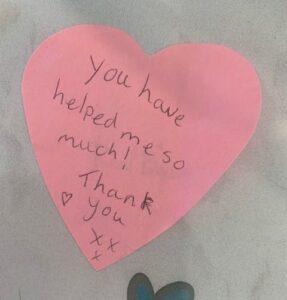
Note left by student following Miss Understood course

